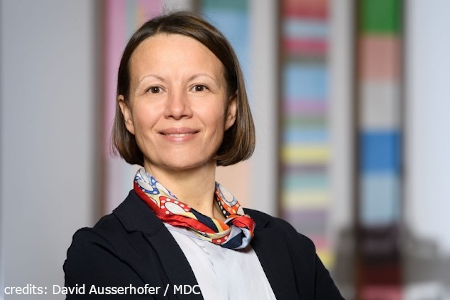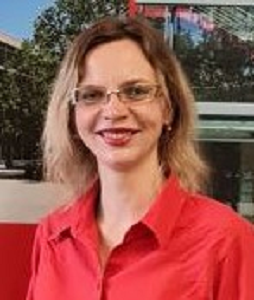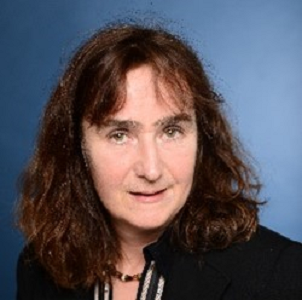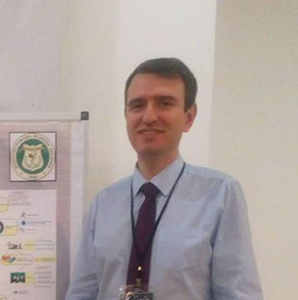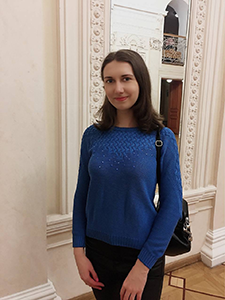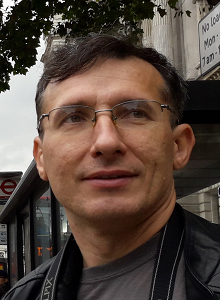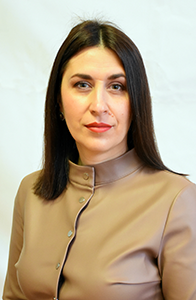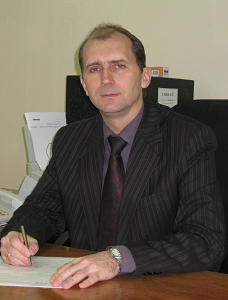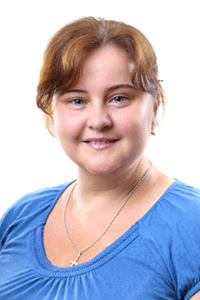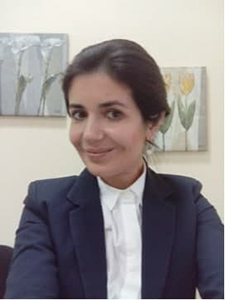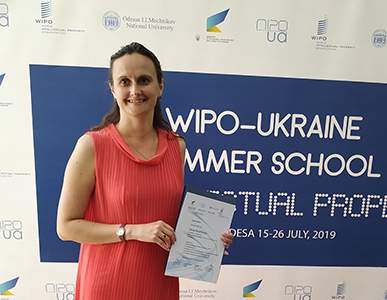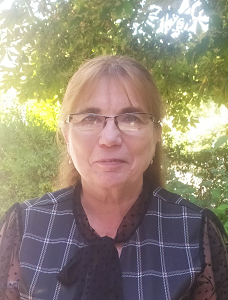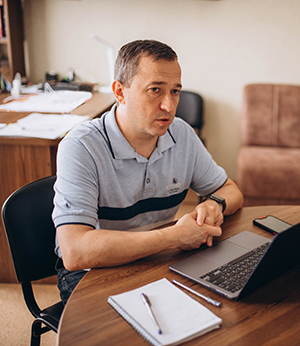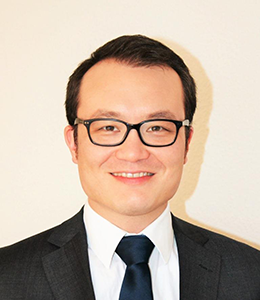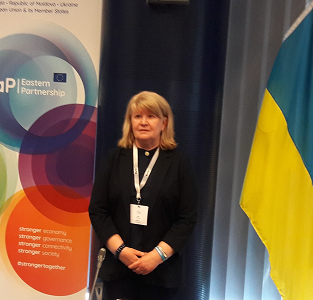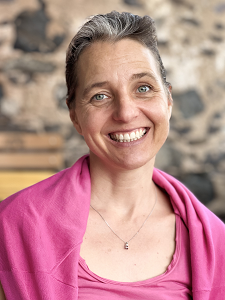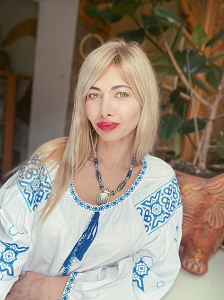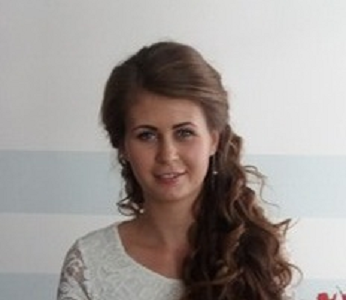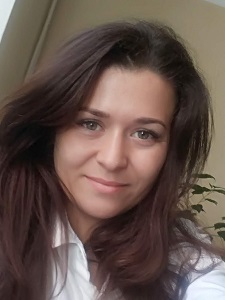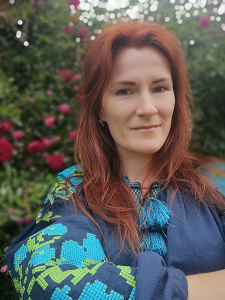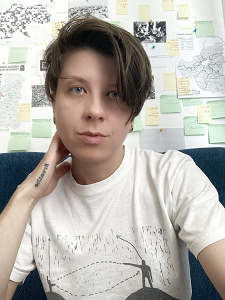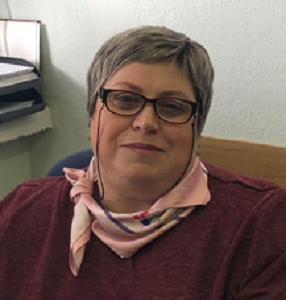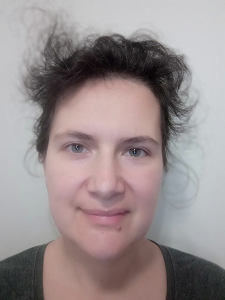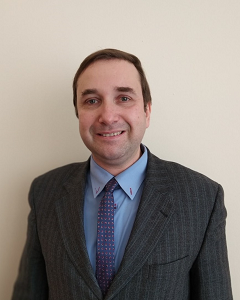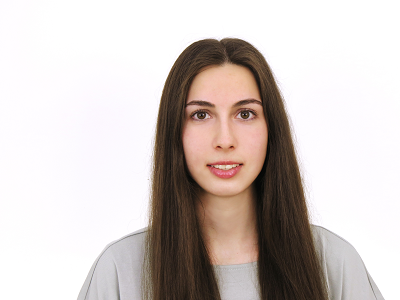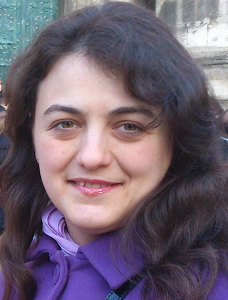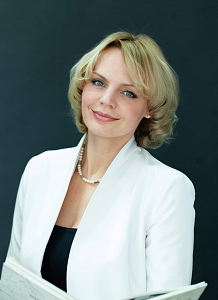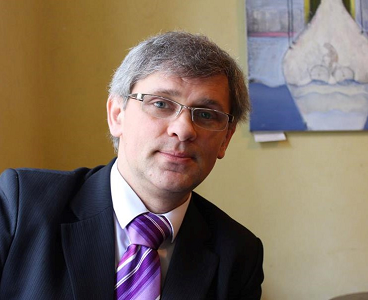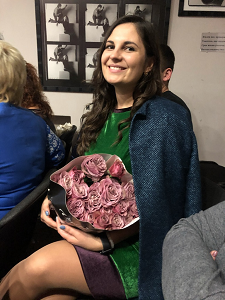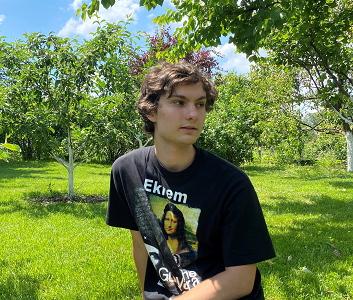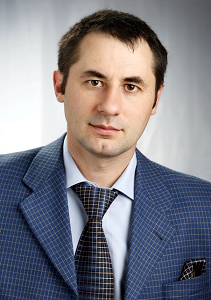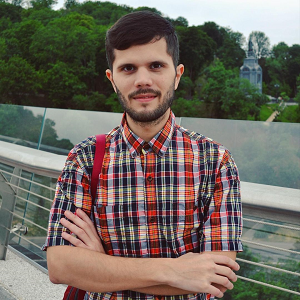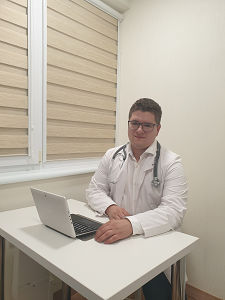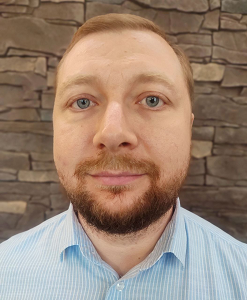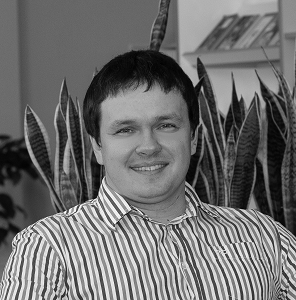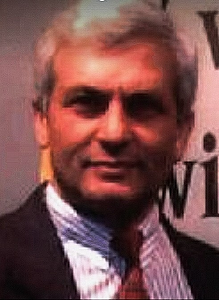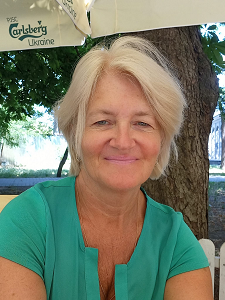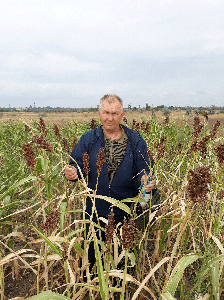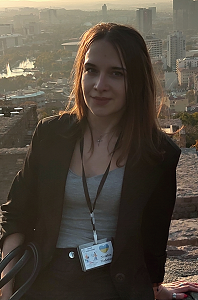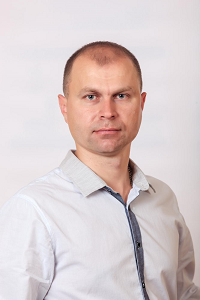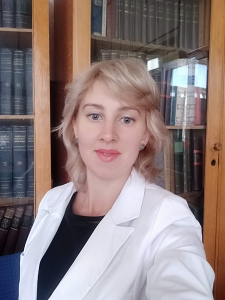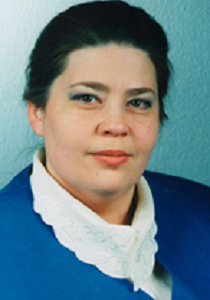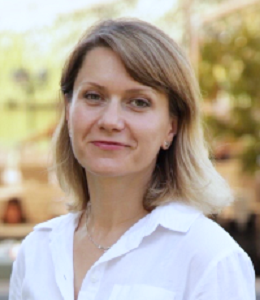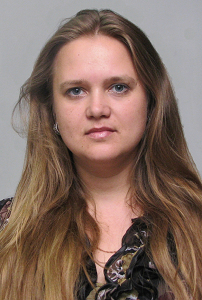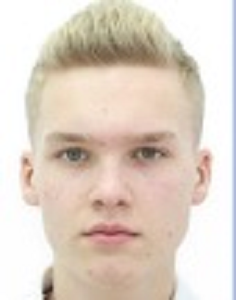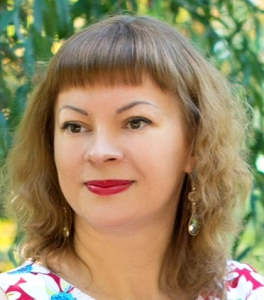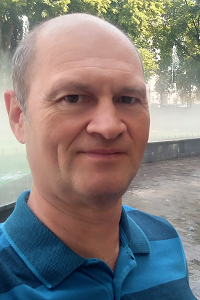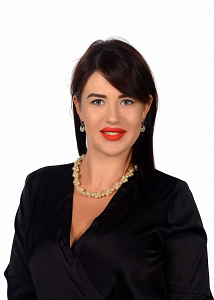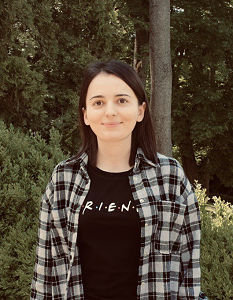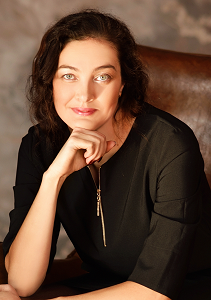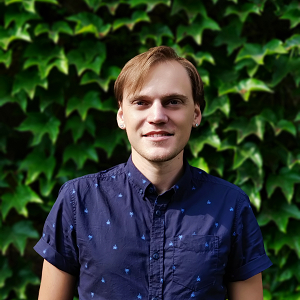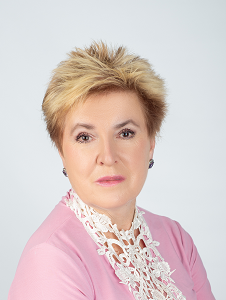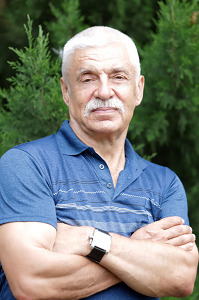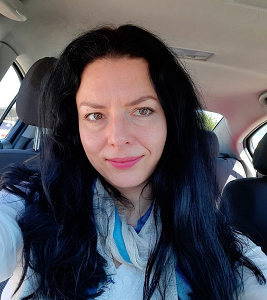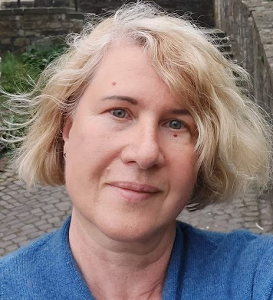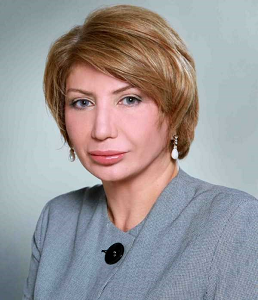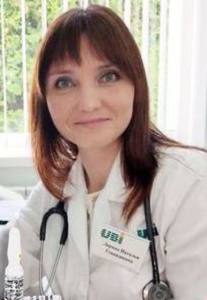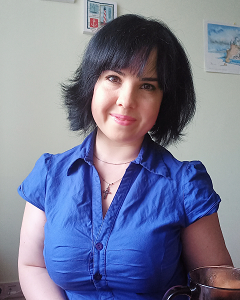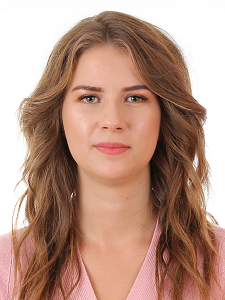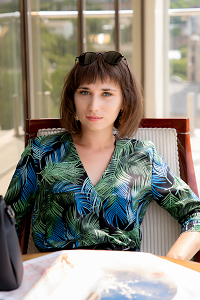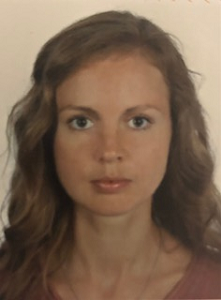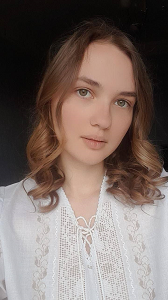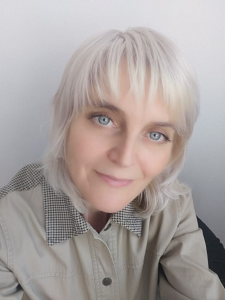Dr. Oksana Seumenicht graduated in Nuclear Physics with honors from the Taras Shevchenko National University of Kyiv, Ukraine (1992). She then carried out her PhD research in Radiobiology at the Institute of Cell Biology and Genetic Engineering, National Academy of Sciences of Ukraine (Kyiv) and gained a PhD in Biology (1995). Oksana Seumenicht worked as a postdoctoral researcher in Ukraine, Denmark, Germany and the UK (including the University of Oxford and UCL), supported by a number of competitive personal fellowships, e.g. from the DAAD (1998-1999), the Royal Society of the Great Britain (1999-2000) and the Wellcome Trust, UK (2000-2002). In 2005 Oksana Seumenicht joined the Research & Commercial Division of Cardiff University (UK) as Research Development Officer. She moved to Berlin in 2006 and was appointed as the first PhD Coordinator of the MDC-HU Berlin International PhD Program “Molecular Cell Biology”. Subsequently she raised funds for and built up the MDC Graduate School, which she managed (2007-2009). In 2010-2018 she worked as the MDC’s International Relations Officer, and since 2018 she works at the Department for Strategic Cooperations and Research Funding, MDC. In 2015 Oksana Seumenicht co-founded the UKRainian Academic International NETwork (UKRAINET) and German-Ukrainian Academic Society (DUAG) in 2016, and she has been serving as DUAG’s Managing Director since. Oksana Seumenicht was born in Kirovograd region, Ukraine, is married and has three children. Research Development Manager, Department for Research Funding Max Delbrück Centrum for Molecular Medicine in the Helmholtz Association (MDC) Managing Director, German-Ukrainian Academic Society
Prof. Kateryna Kovtoniuk
Kyiv National Economic University named after Vadym Hetman
CV: PhD in Economic, Associate Professor of Department of International Economy in Kyiv National Economic University named after Vadym Hetman. Research interests - digitalisation of the economy, new international economic order, economic integration, digital educational tools, inclusive education.
Presentation title: Digital tools in education: collaboration between Ministry of Digital Transformation of Ukraine and KNEU
Abstract: Digital reality has already become an integral part of our lives. Ukraine does not stand aside from the global process of digitalization of the economy. The Ministry of Digital Transformation of Ukraine and Kyiv National Economic University named after Vadym Hetman (KNEU) have joined forces to develop digital competencies for future employees. The new generation of graduates will be in demand in the labor market.
Mechthild Köhler is Programme Coordinator within the Division International Affairs at DFG (German Research Foundation). As part of the team of the Group CIS, Central and Eastern Europe she is responsible for coordination of scientific cooperation with Ukraine, Belarus, Moldavia, Russia, South Caucasus and Central Asia.
Presentation Title: Research funding and institutional cooperation with Ukraine
DFG: The Deutsche Forschungsgemeinschaft (DFG, German Research Foundation) is the central self-governing research funding organisation in Germany. It serves all branches of science and the humanities by funding research projects at universities and other research institutions. With an annual budget of more than 3,3 billion € the DFG funds over 31.000 new and ongoing projects each year.
The DFG provides support for international cooperation. It offers special funding programmes and carries out calls for joint funding of research projects with cooperation partners. With the National Academy of Sciences of Ukraine (NASU) and the National Research Foundation of Ukraine the DFG concluded agreements.
Alina Artemenko
Sumy State University, Educational and Scientific Institute of Business, Economics and Management, Department of International Economic Relations, Ukraine
CV: In 2018 she obtained a master's degree in International Economic Relations at Sumy State University (Sumy, Ukraine). Currently, she is a 4th year PhD student at Sumy State University, the dissertation thesis is Foreign exchange regulation in the system of ensuring macroeconomic stability. She participates in the state budget projects, financing by the Ministry of Education of Ukraine as a Junior Researcher, the "Modeling and forecasting behaviour of financial markets as an information basis for ensuring financial stability and security of the state" (finished in September 2020) and "Fractal model of Ukrainian stock market transformation: socially responsible investing to achieve the Sustainable Development Goals” (from February 2021). She was also participant in international training such as Erasmus+ Student Mobility at Alexandru Ioan Cuza University of Iasi, Romania (14/03/2021 – 30/05/2021), Erasmus+ Mobility of youth workers project in Bratislava (Slovakia, 06/01/2020 – 13/01/2020), and attended a seminar at Hochschule der Deutschen Bundesbank (Germany, 13/05/2017 – 19/05/2017).
Presentation title: Macroeconomic recovery of post-conflict countries: impact investing for sustainable peace (SDG 16)
Abstract: Presently, conflicts do not stop. In addition, the wars have become more local and often turn into a phase of frozen conflict. Local conflicts have increasingly become internationalized because, as a rule, third parties try to intervene in their solution, and international organizations provide financial and humanitarian support to such countries. Post-war countries are fragile as it becomes a challenge to achieve macroeconomic stability and peace altogether, and not all countries can earn positive economic growth after the war. Unfortunately, post-war stagnation is inevitable, and to stimulate domestic consumption and economic activity, countries need to develop clear targets for economic recovery in several directions (fiscal policy and institutions, monetary policy, employment, infrastructure, private sector, agriculture, the banking system and finances) with the attraction of investments. That is why my investigation aims to develop the primary conceptual basis of the country`s macroeconomic post-conflict reconstruction according to the international experience, as well as the role of impact investing in achieving stability and peace. As a result, identify the perspective spheres of impact investments in the future post-conflict reconstruction of Ukraine.
Liudmyla Vlasiuk
National Technical University of Ukraine 'Kyiv Polytechnic Institute'
CV: Education: (1/09/2015 – 31/12/2020) - Master in Philology (Department of Theory, Practice and Translation of English at the National Technical University of Ukraine 'Igor Sikorsky Kyiv Work experience: (Since 08/02/2021) - Translator (1st category) at the International Project Office of International Collaboration Department, National Technical University of Ukraine 'Igor Sikorsky Kyiv Polytechnic Institute'. (Since 10/09/2021) - Lecturer in English at the Department of English for Engineering 1, National Technical University of Ukraine 'Igor Sikorsky Kyiv Polytechnic Institute' (Since 1/09/2021) - PhD student at the Department of Theory, Practice and Translation of English, National Technical University of Ukraine 'Igor Sikorsky Kyiv Polytechnic Institute'
Presentation title: Linguistic indexation of media texts: structural approach
Abstract: Being a highly complex phenomenon due to collecting, sorting and storing data and being aimed at providing high-speed, high-quality and accurate search of information, the notion of «linguistic indexation» has quickly turned into one of the core problems for researchers, especially when it comes to examining it in the media text, which itself poses a huge challenge for scientists engaged in linguistic studies. Detailed and profound research of the issue of linguistic text’s indexation is needed because the necessity of structuring of texts’ information ecosystem over the recent years has become extremely acute problem for modern linguistics. Such demand is explained by the fact that linguists are set to improve the data structure, which contains information about the diverse document by increasing the speed of search of relevant documents, what can only be achieved by qualitative linguistic indexation of the texts.
Dr. Dmytro Lutsenko
Institute for Problems of Cryobiology and Cryomedicine of the National Academy of Sciences of Ukraine, Kharkiv, Ukraine
CV: Lutsenko Dmytro attended the Karazin Kharkiv National University (Kharkiv, Ukraine) from 1991 to 1996 and studied Biology, Human and Animal Physiology. He achieved his Ph.D. in biology (Cryobiology) at the Institute for Problems of Cryobiology and Cryomedicine (Kharkiv, Ukraine). Since 1999, he works at the Institute for Problems of Cryobiology and Cryomedicine: Kharkiv as a researcher at the Department of Cryophysiology. He was part of the 21 st Ukrainian Antarctic Expedition, Academic Vernadsky station in Antarctica from April 2016 to April 2017. His main areas of research include: Study of the physiological mechanisms of an organism's adaptation to the cold. Research of mechanisms of the organism adaptation to stay in the conditions of Antarctica.
Presentation title: Some peculiarity of people’s adaptation during a long stay in the Antarctica
Abstract: We studied the some features of people’s adaptation during the wintering at the Ukrainian Antarctic station "Akademik Vernadsky". By the physiological responses the winterers were divided into 2 groups with a predominance of sympathetic or parasympathetic responses of autonomic regulation. Similar processes were recorded by us during the Cold Pressor Test, therefore we believe that cold is one of the main factors affecting the peculiarities of the vegetative regulation of the organism in the Antarctica. The analysis of several sleep parameters noted that for all participants, quasiperiodic changes in the total duration of the daily representation of sleep were observed. The changes in the parameters of sleep were the result of the interaction of "non-core" factors (chronotype, personal traits), as well as forced contact with cold, which affects sleep. We are grateful to the National Antarctic Scientific Center of Ukraine for supporting the study.
Dr. Antonina Kapustian
Odesa National University of Technology
CV: Antonina Kapustian Doctor of technical sciences (biotechnology), associate professor, Head of the Department of Food Chemistry and Expertise, Odesa National University of Technology, Odesa, Ukraine Field of scientific interests: biotechnology; chemistry of natural compounds; food chemistry; expertise, standardization and certification of dietary supplements and functional food products. Current scientific work: biotransformation of polymers of plant and microbial origin, development of dietary supplements technologies and functional food ingredients of adaptogenic and immunological action based on degradation products of biopolymers.
Presentation title: Postbiotic products as functional food ingredients
Abstract: Of interest is the biological activity of postbiotics and the possibility of their use as functional food ingredients. Postbiotics are products of metabolism and processing of probiotic bacteria, namely, specific enzymes, peptides, teichoic acids, muropeptides, bacteriocins, organic acids, and others. Some postbiotics can cross the intestinal barrier and exhibit systemic antihypertensive, hypocholesterolemic, antioxidant, and immunological properties. Of particular interest is the use and study of the properties of muropeptides (low-molecular degradation products of peptidoglycans of the cell walls of probiotic bacteria) as immunological ingredients of functional nutrition for people with reduced immune status.In this regard, it is necessary to develop a technology for producing low molecular weight muropeptides as immunological functional ingredients
Dr. Serhii Skurikhin
National University "Odessa Law Academy"
CV: Serhii Skurikhin PhD, is associate professor at the National University "Odessa Law Academy" his research interests include legal ethology, theory of law, and legal culture.
Presentation title: Territoriality as a problem of legal ethology
Abstract: Legal ethology is a field of knowledge about legally significant human behavior, based on biological grounds, studies the processes of formation of human legal behavior in ontogeny and phylogeny, as well as the functions and physiological mechanisms of certain forms of legal behavior. Considerable attention within the framework of legal ethology is paid to the interaction of biological and social in human legal behavior.
It should be noted that in the social sciences, in particular, in the field of jurisprudence, the biological nature of man has always been relegated to the background. The factors reflecting its social nature were subject to legal analysis: normalization of legal communication; legal regulation of behavior; compliance of behavior with legal regulations; issues of legal socialization, etc. Scientists do not pay attention to the fact that in some cases, the root causes of human behavior, the causes of the emergence of certain institutions (including the institution of the state), are embedded in the "genetic programs" formed during the long evolutionary development of man as a biological being – from the proto-man to the modern species Homo sapiens sapiens. Legal ethology tries to find points of contact between the biological and humanitarian spheres in order to understand the deep foundations of human legal behavior that stimulate formation of legal norms and mediate the processes of institutionalization of social life.
Today, an armed conflict is taking place on the territory of Ukraine, and legal Ethology allows us to look from a certain angle at some legal aspects related to such a phenomenon as war.
With the help of ethological constructions, it is possible to better understand the mechanisms of the functioning of the armed forces, the hierarchical construction of the army structure, the rationing of the system of power and subordination among military personnel, aggression and aggressive behavior, the formation of "ersatz kinship" between military personnel, as a reflection of the idea of "combat brotherhood", the consolidation in international humanitarian law of norms providing for the protection of victims of armed conflicts, the mechanism of and the reasons for the dehumanization of the enemy during the war, etc. However, within the framework of this study, I would like to focus on the issues of territoriality and its connection with war and aggressive behavior.
Dr. Olha Lukash
Sumy State University, Ukraine
CV: Olha Lukash is an Associate professor at the Department of Economics, Entrepreneurship and Business Administration, Sumy State University (Sumy, Ukraine). She received her PhD in Economics (Economics of nature using and environmental protection) from Sumy State University. Before starting her academic career, she worked as a statistical and finance clerk and analyst at the State Administration of Sumy Region. Her research is focused on environmental economics, global sustainability, transboundary pollution, climate change and cross-border cooperation. She has authored and co-authored numerous scientific publications, textbook chapters, and study guides in these fields. Full CV is available on the link: https://tinyurl.com/y7maxek8
Presentation title: Clean-energy transformations and the effects on the sustainability of regional economies and social-ecological systems
Abstract: Economics of decarbonisation is one of the priorities on the way to global sustainable development. The essential tools for meeting the challenges of the EU Green Deal are the cross-sectoral development of energy efficiency and the development of renewable energy. Today, it is an indisputable fact that society can achieve sustainable growth only by balancing ecological effectiveness, economic efficiency, and social well-being. In turn, clean-energy transformation processes affect businesses, households, and ecosystems. Due to this, active action should first start from a deep understanding and a high-level assessment of fundamental changes in sociodemographic, geographical, psychological, cultural, political, and economic patterns that embrace low carbon, clean-energy transformations. It is necessary to realise the actual effects of such changes on the sustainability of regional economies, ecological systems, and society's welfare. Based on an estimation of such effects, the strategy for further energy development should be developed to achieve sustainable social, environmental and economic development.
Dr. Svitlana Tarasenko
Sumy State University
CV: Tarasenko Svitlana, Dr., Economics, Sumy State University, Ukraine Scientific interests: industrial policy, innovations, entrepreneurship, health care economy, sustainable development, international business. Project activities: 2022-2023 - Kirkland research grant “Directions of Artificial Intelligence Implementation at Economy of Poland and Ukraine: to build back better” 2022 - "AI for Everyone", House of Europe, coordinator of project 2022 - UNIDO/GCIP Ukraine Global Cleantech Innovation Program in Ukraine project, mentor of project 2020-2022 - GAMEON - The Introduction Journey to the Game Industry for NEETs, KA205 - Strategic Partnerships for Youth, Erasmus, Poland, coordinator of project in Ukraine.
Presentation title: Industrial Policy and Societal Readiness Level
Winner of the Essay Competition Resilience Award - Automotive Cluster Ostdeutschland GmbH.
Prof. Dr. Iryne Druzhkova
Odessa National University of Technology
CV: Associate Professor of Philosophy and Law Department, Odessa National University of Technology
2000-2004 Teacher of Social Sciences, Odessa College of Standardization, Metrology and Certification, Odesa
2004-2012, Associate Professor of the Odessa State Academy of Refrigeration, Odesa
2011-2013 Head of the Department of Humanities, Economics and Social Disciplines Odessa State Academy of Refrigeration
2013 - present Associate Professor of Sociology, Philosophy and Law of the Odessa National Academy of Food Technologies (since 2022 ONUT), Odesa
2019 - present an expert of The National Agency for Higher Education Quality Assurance (NAQA)
Presentation title: Narratives of the Occupational Press in Odessa 1942-44, on the example of the magazine "Molva".
Abstract: Advertisements are an interesting phenomenon in the occupational press. Narratives of advertisements well characterize the changes that take place in these years. The press is an important source for recreating the most adequate and close to the truth picture of the past. The role of the press as a historical source is described in a whole layer of scientific works, so we will not dwell on the methodological aspect in detail. There are publications that reveal the main characteristic features of the functioning of the press during the occupation, in the specific historical conditions of Ukraine. Periodicals published in Odessa during the years of the Romanian occupation of 1941-1944. are an important link in a rather meager source base, which allows shedding light on a number of aspects that are practically not covered in problematic and synthetic scientific works. Services that are always in demand were widely advertised - hairdressing, tailoring, etc. A clear sign of wartime was a significant number of thrift stores.
Michael E. Rose, PhD
#ScienceForUkraine / Max Planck Institute for Innovation and Competition
Michael E. Rose, PhD is Senior Research Fellow at the Max Planck Institute for Innovation and Competition (Munich, Germany). He obtained his PhD in Economics at University of Cape Town in 2018. He co-founded the #ScienceForUkraine initiative shortly after the outbreak of the war.
#ScienceForUkraine (https://scienceforukraine.eu/) is an initiative of volunteers providing information about temporary job opportunities for scholars fleeing Ukraine with a wide international reach. Over 2000 scientific groups all over the world have already registered their support offers with us, and we are hoping to get more doors opened to Ukrainian scholars.
Dr. Valentin Siniy
President of Tavriski Christian Institute (TCI)
Presentation Title: Challenges facing theological education in the conditions of the Russian-Ukrainian war: a paradigm shift.
CV: My name is Valentin Siniy. I studied in Kherson State University, graduated in 2003 - MA in History, also graduated from TCM International - MA in Practical Ministry. I finished my PhD in Dragomanov National Pedagogical University - PhD in Theology of Leadership. The topic of my dissertation is "Modern Christian Leadership in Education" I have been the president of Tavriski Christian Institute since 2006.
Chrystyna Kovalska
SOUTH UKRAINIAN NATIONAL PEDAGOGICAL UNIVERSITY- K.D. Ushynsky, Ukraine
CV: Ph.D.Student Chrystyna Kovalska South ukrainian national pedagogical university- K.D. Ushynsky, located in Odesa, Ukraine. As part of the direction of the thesis ' Psychological foundations of building an emotional image of the image of an educational institution in social networks'. According to the work plan, we need to clarify the basic categories that define the subject of the study and the existing theoretical and methodological foundations of knowing the effect of emotogenicity in the image of a person. The results of the work will be focused on improving and using information about the educational institution in information networks for career guidance purposes.
Presentation title: The study of personal preferences of applicants in process of choosing an educational institution using social networks
Abstract: The purpose of the study was to build a methodology for determining personal preferences when choosing an educational institution using social networks and its approval. The scientific novelty consists in the development of recommendations aimed at improving and using information about the educational institution in information networks for career guidance purposes. As a result, it was found that the proposed method gives a reason to expand the possibilities of further creation of a visual presentation of a higher educational institution in social networks, taking into account personal preferences.
Prof. Dr. Larysa Makaruk
Lesya Ukrainka Volyn National University, Ukraine
CV: Larysa Makaruk is Professor of Applied Linguistics Department at Lesya Ukrainka Volyn National University in Ukraine, she is member of the Young Scientist Council at the Ministry of Education and Science of Ukraine. In 2014-2020 she was responsible for the preparation and publication of linguistic journals at Lesya Ukrainka Volyn National University in Ukraine. In 2019-2021 she was the president of the Young Scientist Council at Lesya Ukrainka Volyn National University in Ukraine. In 2013-2019 she was the head of the undergraduate and postgraduate student research society at the Faculty of Foreign Philology and the person responsible for official research work undertaken within the Faculty. She is an active participant of many events related to the research activities organized in Ukraine and abroad.
All her research papers have been connected with the general topic of multimodality. Her theses are devoted to the usage of verbal and non-verbal devices as can be seen in various types of mass media discourse. For the past three years she has been dealing with the short-format texts related to COVID –19. At the present time she is studying cartoons in mass-media sources which are connected with the war which was launched against Ukraine in 2022.
Presentation title: Multimodal stylistic devices in cartoons as powerful tools for depicting the present war in ukraine
Abstract: In a sense, it may be argued that the tragic and outrageous circumstances of Russia’s assault on Ukrainian sovereignty has had the unanticipated result of stimulating cartoonists all over the world to portray various aspects of this new conflict-related situation, utilizing the many multimodal possibilities offered within their chosen medium of expression. These multimodal stylistic devices include several classes of pictorial metaphors as differentiated by scholars: those of the contextual variety, the hybrid variety, and the simile variety; and multimodal metaphor of the verbo-pictorial variety and integrated metaphor (product metaphor).
A large number of cartoonists from various countries create images of Russia as personified by a bear: this corresponds both to the well-known image for Russia which has been in use since the 16th century, and to the predatory behaviour of Putin’s Russia in terms of the recent invasion. Using this image as a starting point, various cartoonists build on it to illustrate metaphorically the actions of Russia.
The goal of this study is to provide an analysis of a selected set of political cartoons dealing with the Russia-Ukraine conflict, taken from a variety of sources around the world. Our objective is partly to obtain an overview of the opinions held by foreign observers with regard to the relations between Russia and Ukraine at various stages of recent history, but even more than that, to present an enumeration and a classification of various stylistic devices that have been utilized in these cartoons. These devices make it possible for the cartoonists to instantly and effectively present specific aspects of the conflict, as well as the notable individuals involved in it.
Frank Albrecht
Alexander von Humboldt Foundation
CV: Frank Albrecht is the Programme Director of the Philipp Schwartz Initiative, the Alexander von Humboldt Foundation's support program for at-risk researchers. He previously served as Programme Officer for North America, Australia, New Zealand and Oceania, and as Senior Coordinator for Strategic Planning. Before joining the Humboldt Foundation, he held temporary assignments at United Nations Volunteers, a UNDP programme, and worked for a UK-based recruitment consultancy, the MRL Group. He holds a M. A. degree in Linguistics from Bonn University.
Presentation title: Funding Programmes of the Alexander von Humboldt Foundation
The Alexander von Humboldt promotes academic cooperation between excellent scientists and scholars from abroad and from Germany. Whether you are a postdoc at the beginning of your career, an established experienced researcher or an eminent world authority in your field, with our research fellowships and awards we provide support that is tailored to your particular career stage. The Philipp Schwartz Initiative is a special fellowship programme for researchers at risk from political persecution or armed conflict. Launched in 2016, it has supported over 400 scholars from 24 countries in re-establishing their research careers in safety in Germany.
Prof. Dr. Nina Didenko
Shupyk National Healthcare University of Ukraine
CV: Nina Didenko, Doctor of Science in Public Administration, Professor of Department of Health Management and Public Administration Shupyk National Healthcare University of Ukraine. Has extensive experience of working as a researcher and a professor at Public Administration program for many years. She has been delivering the courses: “Public administration in the field of European and Euro-Atlantic integration”, “European integration, international public administration and security”, “Democracy and good governance in the EU”, “European social and humanitarian policy”, “European social policy and models of social partnership”, “Civil society institutions and protection of the rights of foreign citizens in the EU”. Has strong experience of participation in international projects.
Presentation title: Protection of proprietary, political and socio-economic rights of Ukrainian citizens in the conditions of war with Russia
Abstract: Russia has started a war against Ukraine, during which it violates all conventions and international agreements. It violates the right to life, the rights of the civilian population, prisoners of war, wounded during hostilities, and sick citizens. In addition to war crimes, Russia is deporting Ukrainians to Russia. In 2019, Russia effectively withdrew from the Geneva Convention for the Protection of Civilian Population in International Armed Conflicts, as a result of which the UN will now not be able to judge Russia for violating the rights of civilians during the war, so a special international tribunal must be created to punish Russian aggressors. In order to be able to answer to these war crimes, in Ukraine has been created an intergovernmental platform, which will collect information on human rights violations by the Russian Federation during the war with Ukraine. Russian aggression led to the introduction of martial law in Ukraine, during which individual rights of Ukrainian citizens are restricted.
Dr. Olga Zhukovska
National Technical University of Ukraine “Igor Sikorsky Kyiv Polytechnic Institute”, Department of Economic Cybernetics, Ukraine
CV: Dissertation Topic of PhD : Interval Models of Collective Decision Making in Conditions of Risk Area of Scientific Interests: Interval Data Analysis, Statistical Data Analysis, Collective Decision Making. Employment: Associate Professor of the Department of Economic Cybernetics, National Technical University of Ukraine "Kyiv Polytechnic Institute". Academic disciplines: Forecasting of Socio-Economic Processes, Bayesian Models of Collective Decision Making Author more than 65 scientific works, 6 books (monograph and textbooks), including: Mathematical Models of Collective Decision Making, Basics of Interval Analysis, Decision Making Theory, Econometrics. Scopus Author ID: 8964321000 https://orcid.org/0000-00 https://scholar.google.com.ua/citations?user=rPGyAxIAAAAJ&hl=ru&oi=ao
Presentation title: Bayesian Strategy of Collective Decision-Making for Credit Scoring Problem
Abstract: In order to reduce credit risk, when making a credit decision, both computer scoring systems and assessments of borrowers by credit experts are used. However, scoring systems cannot take into account the psychological state and behavior of the borrower, which may indicate unreliability. At the same time, the decision-making by a team of credit analysts can be contradictory: one part of the team recognizes the borrower as trustworthy, the other - unreliable. To solve this problem, the report proposes an original approach based on the Bayesian strategy. It is shown that the proposed approach is constructive, since for its implementation it is enough to evaluate the probabilistic characteristics of loan officers and borrowers based on a retrospective analysis of credit histories.
Dr. Vitalina Tarasova
Taras Shevchenko National University of Kyiv (Kyiv, Ukraine)
CV: Name: Vitalina Tarasova Nationality: Ukrainian Date of birth: 11.08.1981 Professional experience: 02.10.2017 – to date Associate Professor at the Department of Foreign Languages at Taras Shevchenko National University of Kyiv (Kyiv, Ukraine) 01.07.2009 – 01.10.2017 Associate Professor at the Department of Romance and Germanic Languages and Translation at the National University of Life and Environmental Sciences of Ukraine (Kyiv, Ukraine) 20 January 2010 - defended thesis for Ph.D. in the specialty 10.02.17 “Comparative-historical and typological linguistics” Thesis “Semantic Field “Vehicle” in the English, German, Russian and Ukrainian Languages".
Presentation title: War in Ukraine: New tendencies of the Ukrainian substandard vocabulary functioning
Alina Yefimenko
Sumy State University, Ukraine
CV: Education 29.12.2018 - master's degree of "Finance, banking and insurance"; Sumy State University,(Banking); June 30, 2018, bachelor's degree of "Law" in State University; since October 1, 2020, - PhD student of "Economics". Work experience Since 01/21/2020 – credit expert at Raiffeisen Bank Aval JSC; 28.01.2019-29.10.2019 – customer service specialist of the Sumy branch of JSC CB "Privatbank";01.12.2017-27.01-2019 – consultant of JSC CB "Privatbank". I have more than 10 publications, participated in conferences, have language certificates. Participation in all-Ukrainian and international scientific conferences: Summer school "European grant projects: the experience of Poland" (September 9-12, 2021, Sumy State University) and etc.
Presentation title: Research of the influence of banking capitalization on the level of money laundering as an economic destabilizing factor
Abstract: The subject of the research is a set of theoretical, methodical and practical provisions regarding the processes arising in the banking capitalization. The object of the study is the banking capitalization as a system-forming factor of macroeconomic stability. The purpose of the work is to assess the impact of capitalization on the level of legalization of the population's income as one of the indicators of the shadow economy, as this will enable institutions to develop an effective resource policy. The dependent variable is the income laundering indicator. Capitalization is a buffer to cover the risk of default of the institution, and is also an indicator of stability and stability of the banking system. From the point of view of behavioral aspects, capitalization can be considered as the public funds mobilization, taking into account the reduction of the shadow economy level. It was determined that with an increase in the ratio of bank deposits to GDP by 1%, the value of the money laundering indicator increases by 1.92 units, and an increase in the profitability of the bank's equity by 1% leads to a decrease in the index by 2.14 units.
Previous publications include:
1. Soloshchuk, L. (2020). The processes of diversification of the non-verbal communicative components in the modern English discourse. Cognition, communication, discourse, 21, 50–60. http://sites.google.com/site/cognitiondiscourse/home; https://doi.org/10.26565/2218-2926-2020-21-04.
2. Soloshchuk, L.V. (2009). Interaction of Verbal and Non-Verbal Components of Communication in Modern English Discourse [thesis for a Doctoral Degree in Philology], Kyiv. Her main research interests lie in discourse studies, theory of interaction of different code systems, non-verbal communication, pragmalinguistics.
RESEARCHGATE: https://www.researchgate.net/profile/Lyudmila_Soloshchuk;
Dr. Larysa Zomchak
Ivan Franko National University of Lviv
CV: Ph.D. Mathematical Methods, Models and Information Technologies in Economics; Associate Professor, Department of Economic Cybernetics; Ivan Franko National University of Lviv (Ukraine) E-mail: This email address is being protected from spambots. You need JavaScript enabled to view it., This email address is being protected from spambots. You need JavaScript enabled to view it. Orcid ID https://orcid.org/0000-0002-4959-3922 Scopus ID https://www.scopus.com/authid/detail.uri?authorId=57221836609 Google Scholar ID https://scholar.google.com/citations?hl=uk&user=63QxUkEAAAAJ&view_op=list_works ResearchGate ID https://www.researchgate.net/profile/Larysa-Zomchak Fields of Interest: economic modeling, econometrics, ecological economics, mathematical economics, machine learning, agricultural economics, bank system, sustainable development, regional
Presentation title: Sustainable Regional Development: Evidence from Ukraine on Panel Data
Abstract: Despite the fact that the war continues, there is already a need to plan the reconstruction of the country. Obviously, different regions will have different needs for reconstruction. However, at the national level, the basic principles of post-war life must be common to all. The purpose of the investigation is to study the sustainable development of the regions of Ukraine in terms of its economic, ecological and social components. The object of the study is the indicator of the level of pollution and its dependence on social and economic indicators that determine the sustainable development of regions, as well as the gross regional product as the main indicator of the economic development of regions. The main tasks are the construction of the panel models of the sustainable regional development of Ukraine. The policy recommendations were made for achieving sustainable regional development.
Iryna Baltaziuk
The National Academy of Fine Arts and Architecture (Kyiv, Ukraine)
CV: Iryna Baltaziuk (*1987, Ukraine). Artist, curator and art historian. Since 2018 she has been working on her PhD thesis at the National Academy of Fine Arts and Architecture. Field of research – symbols of Ukrainian painting at the turn of the XX and XXI centuries. As a public figure, she founded the NGO “Art research platform MOKONSHU”, whose goal is to support Ukrainian artists. She is author of the international art project “#365daysafter”, that was designed to explore the art of the pandemic period in Ukraine, Croatia, Portugal and China. Stories of artists from different local contexts were collected within the project. Her idea of creating a “Library of artist`s stories” as an independent project won a third place in the Falling Walls Lab Ukraine competition of innovations.
Presentation title: The transit zone of the pandemic
Abstract: “The transit zone of the pandemic” is designed to analyse the preconditions for maintaining creative independence in the pandemic period. The research was conducted during the international art project “# 365daysafter”, which aimed to collect stories and voices of artists from four local contexts, analytically study art during the pandemic in Ukraine and around the world. The growing negative impact of social restrictions has prompted the search for ways to break down the walls of isolation and create a virtual “Library of Artist’s stories”. The text of the field study on the limitations of social activity during the pandemic contains stories about the experience of artists from different countries on ways to cope with obstacles, effective examples of successful overcoming the crisis. Analysis of examples of finding effective methods and ways not to lose creative activity in the face of local and international constraints on social life and communication.
Dr. Nataliia Gakhovych
Institute of the Economy and Forecasting of the National Academy of Sciences of Ukraine
CV: QUALITIES: Commitment, sociability, responsibility, ability to work in a team, leadership qualities Consultant on issues of environmentalization of industrial production, development of circular economy, researcher and participant of many social projects, creative workshops/workshops, master classes SUMMARY OF QUALIFICATIONS: Candidate of economic sciences (2011) with a specialty in Economics and management of the national economy, research associate (1998), Senior Research (2015). The author of more than 150 scientific works, including 50 international, co-author of 19 collective monographs.
Presentation title: The War in Ukraine: Global Environmental Consequences
Abstract: The War in Ukraine: Global Environmental Consequences Russia's invasion of Ukraine is not an accidental phenomenon, but a long hybrid war caused by historical preconditions, which leads to huge losses: human casualties, socio-economic shocks, catastrophic environmental consequences and impedes economic progress not only in Ukraine but around the world. The presented research highlights the scale of environmental consequences during hostilities, which negatively affect not only the environment but also the future of mankind, in local development and on a global scale. The pre-war general ecological state of Ukraine is also analyzed. The principles of post-war green reconstruction of Ukraine are determined, ie on the basis of sustainable development and taking into account the European green course. According to the results of the study priority tasks for post-war reconstruction of Ukraine on the principles of green economy which will allow Ukraine to be the high-tech, comfortable, safe, healthy and prosperous country are proved.
Veronika Barvinok
Sumy State University
CV: Background: B.S. with a majority in International Economics (2017) and M.S. with a majority in International Business (2018). Languages: English (B2), German (A2), Ukrainian (mother tongue). Field of scientific interests: higher education, sustainable development, SDG, labor migration in Ukraine, My aim is to reach the doctoral level and continues investigating economic mechanism of higher education. Now, I am working on two research projects about Education system and Ecological issues, actively publishing articles in Ukraine and outside, Scopus \ WoS (20+ publications).
Presentation Title: Stakeholder approach in economic-organizational management of higher education and lifelong education aimed to reduce labor migration in Ukraine
Abstract: COVID-19 and the full-scale war in 2022 higher education have shown the inflexibility of modern economic and organizational management of higher education in Ukraine. In addition, the problem of labor emigration in Ukraine has intensified, which involves the loss of human capital, which is a direct threat to the country's national security. An effectively organized educational system that interacts with all interested parties is able to improve the situation with the departure of labor force abroad. That is why, the stakeholder approach in higher education is analyzed, namely identification of key participants of higher education, analysis of main classification features, their role in educational system, and measurement of their influence, based on economics theories.
Dr. Natalia Trufanova
Institute for problems of cryobiology and cryomedicine of National Academy of science of Ukraine
CV: Senior Researcher in Cryobiochemistry Department, Institute for Problems of Cryobiology and Cryomedicine of the National Academy of Sciences of Ukraine, 23, Pereyaslavskaya str., Kharkiv, Ukraine PhD degree in Cryobiology Member of UNESCO Chair in Cryobiology Assistant professor in Karazin’s Kharkiv national university, Kharkiv, Ukraine Skills: 2D and 3D Cell culture, alginate microspheres production, low-temperature cell preservation (conventional freezing, vitrification), cell storage at ambient temperature, cell viability tests, bio-medical analytics
Presentation title: VITRIFICATION OF TISSUE ENGINEERED CONSTRUCTS (ALGINATE MICROSPHERES, SPHEROIDS) BASED ON MESENCHYMAL STROMAL CELLS
Dr. Serhii Kasian
Dnipro University of Technology, Ukraine
CV: Serhii Y. Kasian PhD, Candidate of Economic Sciences, Associate Professor, The Head of Marketing Department. This email address is being protected from spambots. You need JavaScript enabled to view it. Profile according to the database Google Scholar: https://scholar.google.com.ua/citations Member of the Public Organization "Innovation University" Head of the Promotion of Scientific and Educational Cooperation Ukraine-Poland Department, Public Organization SPACETIME. The member of 07 Management and Administration Sectoral Expert Councils, Specialty 075 Marketing, National Agency for Higher Education Quality Assurance in Ukraine (NAQA). The member of the Ukrainian Marketing Association (Сertificate #602) The Member of the International Educational and Scientific Project "Education for All and Everyone" / Wizyta Studyjna.
Presentation title: Ensuring the Principles of Sustainable Development International Marketing in the Conditions of the Russian-Ukrainian War
Elvira Akhmedova
V. N. Karazin Kharkiv National University, Ukraine
CV: Elvira Akhmedova, a postgraduate student at Mykola Lukash Translation Studies Department of V. N. Karazin Kharkiv National University. Education: 2013–2019 – V. N. Karazin Kharkiv National University, School of Foreign Languages, Bachelor’s Degree and Master’s Degree in Philology, Germanic Languages and Literatures (including transition), Translation (English). Professional Career: 2020-09 – present - A lecturer at Mykola Lukash Translation Studies Department (previous name – Department of English Translation Theory and Practice); 2019-09 – present - A full-time postgraduate student at Mykola Lukash Translation Studies Department of V. N. Karazin Kharkiv National University. ORCID: https://orcid.org/0000-0002-4515-4359; Email: This email address is being protected from spambots. You need JavaScript enabled to view it..
Presentation title: Strategies and Procedures for Fiction Simile Translation from Cognitive Perspective
Abstract: This paper employs instruments of cognitive linguistics to examine English-Ukrainian translation strategies and procedures for fiction similes through establishing conceptual mappings that underlie communicatively relevant (appropriate in a given lingual, cultural and situational context) translations. Unlike the majority of structural-semantic translation papers, this paper conceives a fiction simile not only as a linguistic stylistic figure, but also as a cognitive structure, an explicit conceptual metaphor. Translation strategy is interpreted as a cognitive activity that aims to ensure the communicative relevance of the translated text as a whole through discovering the “golden mean” between foreignization and domestication. Translation strategies instantiate in five translation procedures intended to clarify a certain translation difficulty in the context of a sentence-utterance: retention, replacement, reduction, omission, and addition of a simile. Correlations between the strategies and procedures depend on the cultural specificity or similarity of conceptual mappings behind the linguistic expressions of similes.
Prof. Svitlana, Zoryana Koshova, Hbur
Shupyk National Healthcare University of Ukraine Kyiv, Ukraine
CV: 1. Candidate of Science in Public Administration, Associate Professor of the Department of Healthcare Management and Public Administration 2. Doctor of Science in Public Administration, Full Professor of the Department of Healthcare Management and Public Administration
Presentation title: FUNDAMENTALS FOR THE IMPLEMENTATION OF SPACE ACTIVITIES FOR SECURITY AND DEFENCE
Abstract: This topic is devoted to defining the basic principles of implementation of space activities in Ukraine and EU, the problems of their implementation in the interests of security and defence and ways to solve them. Relevance of the research stems from the need to ensure long-term interests of the state in the field of security and defence. The Ukrainian space industry is unable to ensure the security and defence capabilities of Ukraine. This is due to the lack of a satellite constellation of its own, the lack of cooperation between the State Space Agency (SSA) and the armed forces of Ukraine, a systematic approach to law reform, stable and sufficient funding, independent access to space, and unprofitable state space enterprises. In order to solve these problems, we propose to create Ukraine's own satellite constellation, include the State Space Agency in the security and defence sector, draft and adopt a Space Code, attract foreign companies to continue the commercialisation of space activities, reorganise the existing enterprises, and create an indigenous rocket complex which will increase the country's defense capability in the war and post-war period.
Prof. Dr. Marianna Kichurchak
Ivan Franko National University of Lviv, Ukraine
CV: Associate Professor (09.2003–08.2019), Professor (09.2019–present) at the Department of Economy of Ukraine (Ivan Franko National University of Lviv, Ukraine). Take part in the research programmes of the Department of Economy of Ukraine “State regulation of structural changes in the system of forming the national economy of sustainable development” (registration number 0120U101806), 2020 – present The diploma of Ivan Franko National University of Lviv for the second place in the competition “The best textbook from humanitarian area in 2020–2021 academic year” (Ukraine, October 2021) The author of more than 140 scientific works. The speaker of the webinar “Economic Determinants of the War in Ukraine: Attempts to Analyse based on Insufficient Data” (24.05.2022).
Presentation title: STRUCTURAL MODERNIZATION FOR THE SUSTAINABLE DEVELOPMENT OF UKRAINE’S ECONOMY UNDER MILITARY AGGRESSION
Abstract: Any war is related to the production, exchange, distribution and consumption of limited economic resources in order to ensure protection from military aggression and based on the formation of a military-oriented development. The purpose is to specify the chief directions of structural modernization of Ukraine’s economy for the sustainable development during the war and identify the major factors for a post-war economic recovery. The author has substantiated that structural transformation of the Ukrainian economy should be based on military-oriented business activity and innovations, fiscal policy aimed at ensuring social protection for the most susceptible groups, preservation of human capital and education for young generation, current expenditures on the military operation. In addition, it is vitally important to fund programmes for elimination of the consequences of negative impact on the natural environment. It is found out that structural changes for the sustainable development involve a gradual adaptation of the activities of households, firms and the state to functioning during the war and the formation of the basis for the post-war reconstruction of the national economy.
Tetiana Paliienko
National University "Kyiv-Mohyla Academy"
CV: Tetiana Paliienko received bachelor's degree in 2018 from Taras Shevchenko Kyiv National University, majoring in Economic Theory. In 2020, she received a master's degree at Taras Shevchenko Kyiv National University, majoring in "Economics and Economic Policy". In 2019, she completed distance learning at the World Intellectual Property Organization on the course "Fundamentals of Intellectual Property". Since 2020, she is a PhD student of the Department of Economic Theory at the National University "Kyiv-Mohyla Academy". Since 2022, a teacher at the Faculty of Economics of the National University "Kyiv-Mohyla Academy".
Presentation title: Trademark as an innovative tool of war
Abstract: A trademark acts as a connecting link between producers of goods and services and interested consumers who seek to satisfy their needs. The number of registered trademarks is characterized by stable growth every year, which indicates the effectiveness of using this tool. There is a direct relationship between the value of the brand and the company's income, and the stronger the trademark, the faster the company recovers during a crisis. However, military actions on the territory of Ukraine made the trademark an innovative tool in the economic sphere to weaken enemies when traditional levers are not enough. That is why global brands are leaving the Russian market en masse after the start of the war in Ukraine, creating an economic blockade.
Dr. Nadiia Kirnosova
Taras Shevchenko National University of Kyiv
CV: Nadiia Kirnosova, Female, This email address is being protected from spambots. You need JavaScript enabled to view it., Associate Professor at Chinese Language Department., Taras Shevchenko National University of Kyiv. PhD Diploma of Comparative literature, National University of Kyiv-Mohyla Academy. Doctoral paper: "The Paradigm of Genres and Themes in Pilgrimage Prose of the XVI – XVIIIth centures in European and Chinese Literatures". Translating fiction from Chinese to Ukrainian: Red Sorgium by Mo Yan, Red Poppies by Alai, Flowers of Cotton by Tie Ning, Uncle’s story by Wang Anyi, About Life and Death by Shi Tiesheng, 0:00 on Christmas by Zhou Xiaofeng, Wolf Totem by Jiang Rong Decoded by Mai Jia.
Presentation title: An informational approach to translation of Chinese characters
Abstract: The main requirement for a translated message usually is to achieve an effect, the same to produced by an original one. And usually language unites, constructed the (original) message, is seen to be a source of this effect, but when being translated into another language, this effect changes or disappears very easily, though, according to dictionaries, (target) language unites may be equivalent or very close by lexical meaning to the original ones. This presentation proposes to treat the process of translation not in terms of “meaning” but in terms of “information”, and this is called “an informational approach to translation”. Any Chinese character as an object of translation may be understood as a medium of three kinds of information: cognitive, emotional and motivational, generating three different modalities – visual, aural and vestibular respectively. Thus its informational structure is not equivalent to “monomodal” phonetic signs, and this consideration should be taken into account, when translating messages, written in characters. From the informational approach point of view, messages written in characters should be treated as a complex informational structure.
Nikita Halych
KYIV NATIONAL I. K. KARPENKO-KARY THEATRE, CINEMA AND TELEVISION UNIVERSITY
CV: Nikita Halych graduated from National University of Film, Theater and Television with Master degree in sound design in 2019 and now is getting the doctor of arts degree ibidem. His main field of study is application of sound design in exhibition spaces and audiovisual installations. Since 2017 he is working as a freelance sound engineer and composer on a several short films and animations, as well as creating sound design for exhibitions (GOGOLFEST-2021, GOGOLTrain project).
Presentation title: Models for spatial sound design in exhibitions
Abstract: The presentation focuses on the spatial presentation of multiple sound sources in audiovisual installations - isolated, serial and parallel. Evaluation of possible options is based on the specifics of the viewer’s perception in the exhibition spaces. The study is mainly based on the material of three audiovisual installations that were presented to the public in 2020-2021 in Kyiv, Ukraine. The study aims to provide theoretical models for spatial presentation in exhibition spaces, considering their pros and cons, and finding the optimal field of application for each scenario.
Denis Ratushniy
Taras Shevchenko National University in Kyiv
CV: Taras Shevchenko National University in Kyiv, Philosophy faculty, political sciences department. Member of The program of translations and publications of philosophical literature in the “Mizhvukhamy” institution. Head of Academic Department in the IAPSS (Ukraine)
Presentation title: Adherence to conspiracy theories as a factor in decreasing political consensus in society
Abstract: The main idea of the study is to examine how adherence to various conspiracy theories by voters, supporters, and members of political parties affects a party's ability to accept compromises with its competitors. This topic is of interest because of the significant, but not fully researched, impact of radical conspiracy theories on political actors. The main hypotheses of the paper are: 1) the assumption that even minimal acceptance of conspiracy theories by political parties significantly reduces the possibility of reaching consensus with opponents 2) the assumption that proponents of conspiracy theories are more prone to radicalism 3) the assumption that accusing an opponent of adherence to conspiracy theories also entails confrontation. A research methodology is also being developed. It includes case studies, theoretical methods, and socio-psychological experiments. This research will serve as the basis for my master's thesis in the field of political science.
Dr. Nataliia Dembytska
Taras Shevchenko National University of Kyiv, Ukraine
CV: Associate Professor of the Developmental Psychology Department at the Faculty of Psychology, Taras Shevchenko National University of Kyiv, Ukraine
Presentation title: Psychological view to the personality determinants of Ukrainians’ post-war economic resocialization
Abstract: The psychological bases of Ukrainian people’ socialization has been destroyed after the 24th February 2022. The basic constructs of the Ukrainians life were in danger due to the announced putin`s idea of denazification and its immediate implementation by russians in the practice of the colonization of the Ukrainian state. We mean the deprivation of Ukrainians` spiritual values is experienced even more painfully than the deprivation of personality’s material property. It is important to discuss the results of our study of the personal determinants of Ukrainians’ economic socialization in the war conditions and the socio-psychological technology of the economic culture of entrepreneurship development, which can be justified as one of the ways to solve the Ukrainians post-war recovery issue.
Prof. Iryna Sheiko
Kharkiv National University of Radioelectronics
CV: Educational experience – since 2000. Since 2015 - As. Prof of the Department of Economic Cybernetics and Management of Econoc Security. Since 2008 have been teaching economic disciplines to students in English at the KNURE Foreign Language Training Center. Teaches courses: “Economic cybernetics”, “Decision support systems”, “Riskology”, “Management of Informatization Projects”, “E-commerce”, “Applied |Problems of Economic Modeling”, “Risk Management”, “Enterpise resource Management based on SAP-technologies” (all courses on English at Centre for Education in English), “Innovative Development of an Enterprise”, “Information economics”. English B2 (Cambridge Exam). Scientific interests: Innovation activity, digitalization
Presentation title: Digitalization as a key driver of postwar Ukraine's reconstruction
Abstract: Digital innovations impact on economic wealth and sustainable development was analyzed in research. The purpose of the research is to evaluate the impact of digital innovations on economic welfare for European countries and Ukraine and to analyze the gap and challenges for Ukraine in digital innovation development. Investigation was made on EU-countries and Ukraine statistical data. Methods used: principal component analysis, panel dsts analysis, multifactor regression. The results of regression modelling indicate the presence of a stable positive correlation between indicators of innovative and digital development, on the one hand, and the level of GDP per capita and the index of economic complexity ECI, on the other. Besides, the existence of digital gap between EU-countries and Ukraine was proved, however innovation development indexes of Ukraine correspond Eastern Europe EU-members.Also the perspectives of Ukrainian digital sustainable development in postwar period were analyzed.
Dr. Nataliia Sas
Poltava National Pedagogical University
Presentation title: Transferring changes in the labor market to the content of higher professional training
Abstract:
The author reveals the components of the developed algorithm for transferring the needs of practice to the content of professional training on the basis of the competence approach, namely:
1. Identifying a new component of professional activity
2. Selection and generalization of information about it
3. Identification and description of labor functions - competencies - learning outcomes
4. Justification of the singled-out new component of professional activity in the graduate model
5. Description of diagnostic tools for mastering competencies
6. Creating a curriculum module
7. Selection of pedagogical conditions and means that optimize the effectiveness of the training process.
Andrii Rosynskyi
Kyiv national university of construction and architecture
CV: Teaching Assistant at the Department of Construction Economics; Ph.D. Student in Economics; M.S. in Construction and Civil Engineering.
Presentation title: Economic potential growth of development company through fuzzy set theory utilization in real estate price management
Abstract: Task of rational and effective profit maximization, and therefore economic potential growth of real estate development company, is by its nature too complex and multifaceted to use only precise and clearly expressed models and algorithms for its solution. Range of initial data affecting development company profit is vague and subjective, as it depends on human thinking, approximate nature of inference and its linguistic description. Therefore, purpose of this study is to analyze and determine the set of factors that affect real estate price from development company side, and use it to build a multifactor fuzzy model of real estate price, which can be used in real time throughout the entire project development cycle.
Dr. Olha Ivanova
CV: Ph.D in endocrinology, Kharkiv, V. Danilevsky Institute of Endocrine Pathology Problems of NAMS Ukraine, Kharkov, Ukraine, 2005 Current position: Senior Researcher in Laboratory of Biochemical Research at the V. Danilevsky Institute of Endocrine Pathology Problems of the National Academy of Medical Sciences of Ukraine, Kharkov, Ukraine.
Presentation title: SEX DIFFERENCES IN THE DEVELOPMENT OF DIABETIC CARDIOVASCULAR COMPLICATIONS IN RATS
Abstract: It was established that type 2 diabetes mellitus in rats more significant increases of glucose intolerance, insulin resistance, hypertriglyceridemia, and the level of total lipids in the liver of males compared to females. Type 2 diabetes increased more significant the level of lipid peroxidation products and decreased the total antioxidant activity of blood serum, which was accompanied by a more pronounced oxidative stress in the heart of diabetic males compared with females. Type 2 diabetes activates the antioxidant defense system in rat mitochondria in females and suppressed it in males. Type 2 diabetes more significantly decreases the activity of aconitase and succinate dehydrogenase in the heart mitochondria and activates of non-specific mitochondrial pores (mPTP) in males. It was shown that type 2 diabetes is accompanied by more pronounced disorders of the system of coagulation haemostasis and the development of myocardial diastolic dysfunction in females. The results indicate the perspectives of new methods development for prevention and treatment of diabetic cardiovascular complications, taking into account sexual dimorphism of major cardiovascular risk factors of type 2 diabetes mellitus.
Roman Nikolaiev
Dr. Yurii Derevianko
Sumy State University
CV: Yurii Derevianko Docent (comparable to Assistant/Associate Professor) Department of Economics, Entrepreneurship and Business Administration, Academic and Research Institute of Business, Economics and Management, Sumy State University [ 01/09/2011 – Current ] Sumy, Ukraine Research interests: Time Factor in Economics, Sustainable Development, Resources Constraints, Efficiency Teaching courses: Sustainable Development, Economic Systems Efficiency, Economics of Development, Managerial Economics, Behavioural Economics, Regional Economics Candidate of economic sciences (PhD comparable) by speciality 08.00.04 “Economics and Management of Enterprise” (2009) The best teacher through the eyes of students (2019 and 2020) Full CV link: https://tinyurl.com/2ryhvstc.
Presentation title: Time Consequence for Business Performance Indicators
Abstract: Calculating and analysing business performance indicators seemed to be a relatively routine matter. However, as we know, there is never anything classic and stable in business because crises are repeated, and the company always desires to be at the forefront of fighting and preventing crises. Our proposal on this path is to take into account the effect of the time factor more deeply than before. Of course, time is always an attendant indicator of performance measurement. However, we would like to make it (time) the main one, and other business indicators - auxiliary for business decision-making. In general, we propose to develop a complex assessment of the time use in business. This method is based on standard financial reports, such as a company's balance sheet for convenience and the need for minimal changes in business reports. For example, we offer a detailed time estimation of the cost of the firm's debt. The essence is a graphic and indicative time assessment of the debt. This method allows the company to manage debts more flexibly and quickly anticipate the onset of the crisis. The basic idea is a debt time-shot for business performance indicators.
Prof. Dr. Leonid Fainzilberg
National Technical University of Ukraine “Igor Sikorsky Kyiv Polytechnic Institute”, Department of Biomedical Cybernetics
CV: Topic of Dr. Sci. Dissertation (2004): «Methods and tools for estimating the state of an object from signals with locally concentrated features»
Author more than 300 scientific works and inventions, including 8 books.: The international cooperation:
• licensing agreements with TESCO on device CARBON (Hungary, Ozd, 1984-1987),
• joint project with LUM GmbH on program Transform. (Germany, Berlin, 1997-2000),
• joint project with SQWID AG company (Germany, Essen, 1999-2002) Academic disciplines:
• Decision Making Theory,
• Fundamentals of Artificial Intelligence.
Scopus Author ID: 6508231615 (52 Citations in 42 papers, h-index 4) ORCID 0000-0002-3092-0794 Google Scholar (1277 Citations , h-index 19)
Presentation title: MATHEMATICAL METHODS AND INTELLIGENT COMPUTER TOOLS FOR ANALYSIS AND INTERPRETATION OF CYCLICAL SYGNALS IN DIGITAL MEDICINE
Abstract: Typical examples of cyclic signals are electrocardiograms, rheograms, photoplethysmograms and other biomedical signals reflecting to the cyclic nature of the work of the circulatory and respiratory systems of a living organism. The report develops efficient mathematical methods, original computational procedures and intelligent computer tools that provide processing of cyclic signals for preventive and clinical medicine. Proposed approaches are based on a stochastic model of generating a cyclic process according to a reference pattern that has diagnostic value under internal and external disturbances. As a result of such distortions, informative fragments that characterize the regular features of the process under study can be hidden from the researcher. The proposed mathematical methods and intelligent computer procedures are aimed at restoration of the form of the reference pattern of the studied cyclic process hidden by perturbations. On the basis of the proposed approach, original preventive medicine tool.
Prof. Dr. Liudmila Grygorieva
Petro Mohyla Black Sea National University, Mykolaiv, Ukraine
Presentation title: Biological Reclamation and Decontamination of components of Technical Ecosystems
Abstract: This annotation presents the results of research carried out by a group of scientists ... for finding biological tools to protect freshwater ecosystems. This is due to the high man-made load on freshwater ecosystems due to the creation of artificial technological reservoirs, cooling ponds, bio-purification ponds, which accompany many industrial enterprises. In particular, this concerns the production of electricity at nuclear power plants (due to the creation and use of cooling ponds). Also presented the results of our research for the terrestrial ecosystem of the man-made massif for one of the tailings storage facilities of the non-ferrous metallurgy enterprise - the sludge storage facility of the Mykolaiv alumina plant. The results demonstrate possible ways of reducing the processes of deflation of toxicants from the surface of tailings. Key words: Biological Reclamation, cooling pond, radiation capacity
Prof. Dr. Mykola Kharytonov
Dnipro State Agrarian and Economic University
CV: Prof. Mykola M. Kharytonov. D. Sc. (Agriculture), Department of Soil Science and Farming, Dnipro State Agrarian and Economic University, Dnipro, Ukraine ORCID: 0000-0002-9886-678X; SCOPUS ID: 20734753300; Dr. Mykola Kharytonov is a Soil Science and Environment Engineering Scientist, MSc in Biology, Ph.D. in animal feeding and forages processing technologies; Habilitation Doctor of Agricultural Science (Ecology). His professional activities have been developed in the agri-food and by-products production sector and agri-waste management to grow second-generation energy crops in reclaimed mine lands.
Presentation title: THE CULTIVATION OF ENERGY CROPS ON RECLAIMED MINELANDS TO GET BIOFUEL AND BIOMATERIALS
Abstract: The limitation factors to transforming young rocks into “young” soil are shown. Several types of rock substrates are suitable for growing herbaceous crops as raw materials for biofuel and biomaterials in research land reclamation station in the southeastern part of Ukraine. Several amendments (ash of sunflower husk, municipal sewage sludge, mineral fertilizer) were tested in different rates. By changing soil characteristics, amendments indirectly affect the thermal behavior of Miscanthus, Switchgrass, and Sweet Sorghum biomass. Moreover, amendments significantly affect the thermal stability of biomass at the initial stage of thermolysis. The thermal decomposition stages of the biomass depend on the crop, soil, and rate of soil amendment.
Dr. Nataliia Maksiuta
National University "Yuri Kondratyuk Poltava Polytechnic"
CV: Nataliia Maksiuta, Ph .D., National University "Yuri Kondratyuk Poltava Polytechnic", Ukraine. Head of the department of organizational and analytical support of the educational process Philosophy Doctor (Ph.D.) Specialty 183 - Environmental Protection Technology, DRNo.002196, topic "Improving the monitoring of air agglomerations (on example of Poltava)"/ Specialized Academic Council DF35.056.046, Author of 23 publications in domestic and foreign publications, including 4 scientific articles included in Scopus (h-index 2), 3 articles in professional journals of Ukraine, a foreign collective monograph, 13 articles in collections of conference materials and abstracts of reports, 2 documents of regional significance.
Presentation title: H2 - POLTAVA ECO-CITY
Abstract: The comfort and recreational attractiveness of the city's habitat is impaired by chemical pollution and noise pollution. The contribution of road transport emissions to air pollution in Poltava is already up to 85%. The noise load caused by the unregulated traffic system of both cars and trucks through the streets of the city has become an integral part of its microclimate, which significantly reduces the comfort of living and affects the level of morbidity of the population. The idea of the project is to develop a model of municipal transport greening in Poltava, which includes a set of measures aimed at reducing chemical pollution and noise load on the atmospheric environment of the city environment. Namely: conversion of municipal transport with installations of alternative energy - hydrogen fuel and reorganization of the system of city transport flows. The advantage is a significant reduction in the flow of dangerous combustion products into the environment and optimization of city traffic. As a result, it will become one of the components of the concept of development of Poltava as a "green standard", will increase the recreational value and tourist attraction of the city.
Dr. Olena Pareniuk
Institute for Safety Problems of Nuclear Power Plants of National Academy of Sciences of Ukraine
CV: Olena Pareniuk is a senior researcher in the Institute for Safety Problems of Nuclear Power Plants of National Academy of Sciences of Ukraine and Associated professor of National University of Life and Environmental Sciences of Ukraine. Her studies radiation microbiology, focusing on the bacterial diversity of radionuclide contaminated soil of Chornobyl and Fukushima exclusion zones, as well as bacterial inhabitants of corium in the destroyed units of both NPPs. She obtained her PhD in 2013 from the National University of Life and Environmental Sciences of Ukraine and spent two years in the postdoc fellowship in Japan, in the Institute of Environmental Radioactivity of Fukushima University. She is a main project researcher of several projects focusing on biodiversity of fuel-containing mat
Presentation title: New Safe Confinement of Chornobyl NPP as an experimental field for biological research
Yelyzaveta Budakva
Institute of Pig Breeding and Agro-Industrial Production of the NAAS
CV: My name is Yelyzaveta Budakva. I am PhD student and a junior researcher at the genetics laboratory of the Institute of Pig Breeding and Agro-Industrial Production of the NAAS. As part of the direction of the thesis “Association of DNA markers for the performance of native and immunologically castrated pigs” according to the working program 31.01.00.07. F. Investigate the pleiotropic effect gens whose SNP is used in marker-associated pig breeding, special attention is paid to the study: creation of a reference base of reference haplotypes of the mitochondrial genome of hybrid pigs to explain the origin and migration of cross-border pig breeds in Ukraine; search for the association of mitochondrial DNA haplotypes with QTL markers by phenotypic characteristics, indicating the economic value.
Presentation title: Creation of a reference base of reference haplotypes of the mitochondrial genome of the final pig hybrids to explain the origin and migration of cross-border pig breeds in Ukraine
Abstract: According to research by many scientists in the world - the data indicate that pigs were independently domesticated in many countries around the world. However, data on the origin and migration of domesticated pigs in east Asia and cross-border breeds and lines of pigs in Ukraine are still not enough. Phylogenetic analysis was performed in hybrid pigs by screening specific haplotype mutational motifs, pig mtDNA sequences derived from the phylogenetic tree. The use of mtDNA phylogenomic analysis of cross-border breeds of pigs is a reliable tool for determining the origin of hybrid pigs. Since the genetic diversity of mtDNA subspecies of wild and domesticated pigs is limited by the existing lines, one haplotype of the mitochondrial genome does not indicate a specific breed, due to the fact that several breeds have the same haplotype mtDNA. This suggests that research should focus on the classification and identification of the phylogenetic origin of cross-border breeds of hybrid pigs. I believe that the "hybrid" subspecies of wild pigs with some morphological features of a domesticated pig had a higher proportion of full-genome ancestors of domestic pigs compared to the morphologically pure subspecies of wild pigs. In particular, subspecies of European and Asian wild pigs are the pro-maternal basis on the maternal line, which preceded the domestication and breeding of cross-border breeds of hybrid pigs. However, due to the small amount of sample size and the limited expansion of phylogeny based on partial D-loop sequences of mtDNA of pigs a detailed picture of the origin and migration of cross-border pig breeds has become an interest in the development of to the development of a service base of reference haplotypes of the mitochondrial genome of cross-border swine breeds in Ukraine.
Anastasiia Torianik
Kyiv Academic University
CV: Anastasiia Torianik, Zaporizhzhia Master of Applied Physics and Nanomaterials, Kyiv Academic University. Radiobiologist, Volunteer.
Presentation title: Chornobyl educational hub
Abstract: The events of February/March 2022, which are associate with a 2022 full-scale russian invasion of Ukraine, once again demonstrated the importance of education and horizontal communication in such critical areas as nuclear and radiation safety. The consequences of the occupation of the Chornobyl NPP and of the captured Zaporizhzhia NPP require a revision of approaches in this field. It is planned to create an Chornobyl educational hub based on the Institute for Safety Problems of Nuclear Power Plants NAS of Ukraine that can be used for the learning process and holding conferences, as well as a laboratory complex open to students and international researchers.
Katerina Kravets
National University of Physical Education and Sports of Ukraine
Presentation title: A study of the effects of a balanced diet and protein shakes based on whey and pea protein on physical performance, body composition and weight loss processes in people engaged in fitness
Abstract: When losing weight, one of the problems is the loss of lean body mass (muscle). But a number of studies have shown that increasing the use of proteins can contribute to the preservation of dry body tissues, and an important factor is the reduction of appetite, which has been proven by research groups. The feeling of satiety and satisfaction increases with increasing protein intake. Protein consumption increases the release of protein YY, glucagon-like peptide, cholecystokinin, which are negative regulators of the feeling of hunger, and decreases the concentration of acylated ghrelin in the blood, which is one of the main factors of appetite. The increase in the amount of protein in the study was carried out with the help of protein products of animal origin, as well as two types of proteins - whey and pea Protein shakes based on pea and whey protein can act as an effective and convenient way to increase the amount of protein in the diet without stressing the digestive organs.
Olesia Kanash
PhD Student at Admiral Makarov National University of Shipbuilding
Presentation title: Road map of the implementation of a dual form of education in higher education institutions
Abstract: The topic of dual education is on the agenda of the Ministry of Science and Education of Ukraine officials, the scientific community, rectors and other top managers of higher education institutions past several years. It has always been observed as a tool to improve students' acquisition of professional competencies, which they will need in the future both in our country and abroad. At the same time, it turned out that beyond discussions and loud declarations of "commitment" the practical matters have not been materialized. Some individual case, which had place , were more likely irrefutably confirmed this conclusion than refuted it. In view of the above, authors set the goal of developing a road map - step-by-step recommendations for the implementation of the relevant process. By the way, it was found that it is characterized by the formation of relations between all stakeholders - individuals and legal entities that depend on the functioning of educational institutions or are able in one or another way to influence their academic activities. The development of these relations, further their diversification and filling with new content, which reflects the current events in the economy and forecasts of its prospects, takes place in three-dimensional space. The first is the institutional dimension. The second is the organizational and legal dimension, and the third is the economic one . The options of strategies that face the key participants depending on their place in the professional life cycle were outlined. Particular attention was paid to the problems facing the executive staff of higher education institutions (including professors, administration, departments of academic activities support), and employers. It is natural that they expect state support for their constructive initiatives and plans for implementation. Its mission is to find and identify the proper means of motivation at the legislative level. The authors also paid attention to the regional chambers of commerce and industry, which represent the interests of local business clusters and thus are interested in the implementation of dual education.
Dr. Olha Skrypnyk
Kyiv National University of Construction and Architecture
CV: Kyiv National University of Construction and Architecture, Department of Construction Economics.
Presentation title: Formation of marketing pricing policy of construction industry enterprises in conditions of economic cyclicality
Abstract: The work is devoted to the development of theoretical and practical aspects of improving the marketing pricing policy of the construction industry as a key element of the system of integrated regulation of pricing for construction materials and products. It is established that regulation of pricing in modern conditions is a complex influence on economic processes by the state (macro level), branch associations of manufacturers (meso level), and enterprises-manufacturers (micro level) for achieving economic purposes of each of these subjects as well as social effect. Suggested a definition of the concept of “social efficiency of pricing policy” as a cumulative degree of influence of pricing policy of the enterprise on the welfare of its owners, employees and consumers and society as a whole, which should be quantified by expected GDP growth short-term and longterm. The expediency of classifying construction materials and products, which occupy a significant share in the cost of construction, as “socially significant production goods» is proved.
Dr. Oksana Kushnirenko
State Organization “Institute of the Economy and Forecasting of the National Academy of Sciences of Ukraine”
CV: An expert in development of a business model for entrepreneurship, cost management, innovative development, project management, startup growth Candidate of economic sciences (2007), Associate professor (2009), Senior researcher (2015), Doctor of Economics (2021). Consultant in business modeling and cost management in companies, researcher and participant of many social projects, creative workshops/workshops, master classes; developer and trainer of the Incubation Program "Booster of Innovation Projects 2021". The author of more than 200 scientific works, including 50 international, 5 educational books, co-author of 20 collective monographs. Research direction: Global food security, value chains, Industry 4.0; circular transition; wartime economy
Presentation title: Consequences of military aggression: risks to the global food security
Abstract: The presented study reveals the main consequences of the russian military invasion for global food sustainability. Important factors of acute disturbance affecting the global food supply have been identified, especially vegetable oil, grains, corn and oil seeds, miscellaneous grains and fruit. Since Ukraine is an active supplier of food to the world market, the study identified threats to the sustainability of the Global Food System. Based on the results of the research, comprehensive directions for supporting the recovery of the food industry are proposed. This will help avert a humanitarian disaster to ensure food security. The methodology of the study is derived from the main general scientific and special methods of knowledge of economic phenomena, namely, structural analysis and statistical methods - еstimation of food industry losses due to war destruction; rating methods and comparative analysis - to determining the role of Ukrainian food industry in ensuring global food security; methods of induction and deduction as conceptual basis of formation of effective tools for Ukrainian food industry recovering.
Dr. Gennadiy Sandrakov
Taras Shevchenko National University of Kyiv
CV: Curriculum vitae of Gennadiy V. Sandrakov Faculty of Computer Science and Cybernetics, Taras Shevchenko National University of Kyiv, 64, Volodymyrska Street, 01601 Kyiv, Ukraine This email address is being protected from spambots. You need JavaScript enabled to view it., This email address is being protected from spambots. You need JavaScript enabled to view it. http://www.scopus.com/authid/detail.url?authorId=6701865264; https://scholar.google.com/citations?user=ZetuzWoAAAAJ\&hl=en http://www.researcherid.com/rid/P-4317-2017; http://om.univ.kiev.ua/en/user-43/mainsen/ Doctor of Physical and Mathematical Sciences, Department of Mathematics and Mechanics, Taras Shevchenko National University of Kyiv 2000, Senior Research Scientist, Taras Shevchenko National University of Kyiv, 2008.
Presentation title: Homogenization methods for composite materials, porous media, and possible modeling of photonic crystals.
Abstract: Homogenization methods for composites as heterogeneous materials and periodic composites with microscale will be discussed. Heat transfer examples and homogenized problem with memory effect for the composites will be presented. Approximation accuracy statements for solutions and energies will be pointed. These are necessary for the computer solution of the problem with guaranteed accuracy. The research explains why composites with weakly conductive inclusions are good thermal insulators. Possible generalizations for investigating homogenization techniques for photonic crystals and nanocoatings will be indicated.
Yehor Yevsieieiv
Vilnius University
CV: 14 September 2020 – Recent Days Bachelor’s degree student - Faculty of Information Systems and Cyber Security, Vilnius University, Kaunas, Lithuania
Languages: Native: Ukrainian, Russian Fluent: English Communication skills Excellent verbal and written communication skills both in an office environment and with external stakeholders.
Experienced at giving presentations due to participation in university seminars and often performance for students' audience.
Job-related skills Analytical and logical mind structure as well as great team player skills for achieving better results in a command project.
Presentation title: Personal data protection in European Union
Dr. Natalia Marakhovska
Mariupol State University, Masaryk University
CV: Natalia Marakhovska is an Associate Professor in the Foreign Languages Faculty at Mariupol State University, Ukraine. She has been teaching in such subject areas as Methodology of Foreign Language Teaching, Self-Management and Leadership, English for Specific/Academic Purposes and English Medium Instruction. In her PhD thesis she examined the pedagogical conditions for developing leadership qualities of pre-service teacher trainees. Her research interests include self-actualisation and leadership in teacher education, inclusion and open education. She has recently joined the Department of English Language and Literature at the Faculty of Education, Masaryk University, Czech Republic under the programme "Masaryk Helps Ukraine" aimed to support Ukrainian students, academics and their families.
Presentation title: Guided Meditation in Foreign Language Teaching of Students from War-Affected Areas
Abstract: The research is aimed at developing cognitive skills of students from war-affected areas in the process of foreign language teaching. Such learners being forcibly displaced from their localities represent a vulnerable group and need respective pedagogical support to facilitate their learning. Special focus should be given to distance education, inter alia to creating safe digital environments for internally and externally displaced students, implementing new teaching approaches, finding authentic materials and resources, and employing them beyond traditional coursebooks. During the pedagogical experiment the learning model based on guided meditation was carried out in four stages according to Piaget`s theory of cognitive development and the STAR Framework: sensorimotor (presentation of information), preoperational/symbolic (perception of information), concrete operational (information processing), formal operational/expressive (accommodation of information) and reflection (information retention). The research findings demonstrate the rationale of using sleep and meditation content for increasing students’ memory capacity and quality of vocabulary acquisition.
Dr. Anatoly Litvinov
State Biotechnology University, Kharkiv, Ukraine
CV: Dr. Anatoly Litvinov is a professor of Finance, Banking and Insurance at State Biotechnology University, Kharkiv. He has a solid practical background in banking (worked as Deputy Head of Division of Regional Network Monitoring at UkrSibbank, Head of the Branch at Index Bank, Head of Financial Analysis Department at Bank Basis). He obtained a doctoral degree in Economical Sciences in 2019. Now he is struggling to deliver his students the highest level of expertise and performs research in behavioural finance and other financial domains.
Presentation title: Rational Financial Behavior Patterns at Social Extremes (on the Example of Russia's Genocide in Ukraine 2022)
Prof. Alina Yanko
National University «Yuri Kondratyuk Poltava Polytechnic», Ukraine
Presentation title: Creation of real-time highly reliable computer systems based on using a non-positional number system in residual classes
CV: From 2014 worked as an assistant at the Department of Computer Engineering, and after the defense of the candidate thesis in 2016 until now as associate Professor of the Department of Computer and Information Technologies and Systems of the National University «Yuri Kondratyuk Poltava Polytechnic». Research area is to increase the performance of CSs and reliability of the processing of integer data by developing and implementing methods for monitoring, diagnosis and correction of errors in the residual classes system. The total list of published scientific works consists of 128 titles, among which there are more than 54 articles in professional journals, 19 patents, 7 monographs. Winner of the 2020 award of the President of Ukraine for young scientists.
Abstract: The report is directed to research at strengthening the national security of the state in the information sphere on the basis of ensuring the reliability, confidentiality, integrity and availability of state information resources, information with limited access, including the one that circulates on the objects of critical information infrastructure in the conditions of information and hybrid wars. The content of the project is: analysis of the state of information security in modern computer systems (CS) and networks, including those with critical functions; substantiation of requirements and directions of development of the CS and networks in order to increase the information security in the CS and networks on the basis of the development of models and methods of information exchange; obtaining new scientific and scientific-technological achievements in the development of dual-use technologies in the field of application of a non-positional counting system in residual classes; increasing the speed and integrity of processing integer data in the CS and dual-use networks, including applications for cryptographic data transformations.
Nataliia Skidan
Yaroslav Mudryi National Law University and University of Liege
CV: Nataliia Skidan is a PhD Student at the Yaroslav Mudryi National Law University (Kharkiv, Ukraine) and Visiting researcher at the Faculty of Law, Political Science and Criminology at University of Liege (Liege, Belgium). Since April 2022, Nataliia has been a trainee at the University of Liege. In September 2021, Nataliia began her postgraduate studies at the Yaroslav Mudryi National Law University. Approved thesis topic is ‘Case law in the system of sources of criminal procedural law in Ukraine’. In February 2021, Nataliia received a Master’s Degree at the Yaroslav Mudryi National Law University. In June 2019, Nataliia received a Bachelor’s Degree at the Yaroslav Mudryi National Law University. She is studying law, that’s why her interests include criminal procedure law, human rights, case law and its unity. Her mission is to assist in the promotion, exercise and protection of human rights, particularly during criminal investigations. She participated in conferences and webinars where she also presented her theses and papers.
Presentation title: Case law as a source of law in the field of criminal procedure in Romano-Germanic legal tradition
Abstract: An intrinsic feature of any field of law is the hierarchical system of its sources. The particularities of the regulation of legal relations in each law sphere are determined by the elements of such a system (i.e. the sources of law in themselves). In Anglo-Saxon legal systems, case law is a recognized source of law, which occupies an important place in the entire legal system. However, for legal systems belonging to the Romano-Germanic legal tradition, this issue is not so straightforward. On the contrary, it has always been and still is a subject of discussion among scholars and practitioners, including in the field of criminal procedure.
As a rule, in the field of criminal procedure of Civil Law countries, case law belongs to secondary law sources. However, in fact, judges tend to follow previous judicial decisions. Therefore, one may raise the following, somewhat pleonastic question: Is ‘case law’ really a ‘source of law’?
This question can be further split up in several sub-questions. First, should courts take into account the legal positions contained in previous court decisions? Second, can participants in criminal proceedings refer to such decisions to argue their position? Third, can courts interpret the law or even ‘create’ a new one?
This study will put forward a preliminary methodological approach which could help solve this crucial theoretical and practical problem. The proposed approach is based on philosophy and theory of law, focusing in particular on the philosophical concept of validity by Robert Alexy. Alexy described three concepts of validity: the sociological concept of validity, the ethical concept of validity and the juridical concept of validity. These three concepts of validity correspond to three elements of the concept of law: social efficacy, correctness of content and authoritative issuance.
Considering Alexy explained the concepts of validity through the lens of the validity of norms, this study will first present the general points of each validity concept, as well as some Ukrainian and Belgian examples (both countries whose legal system belong to the family of Civil Law systems). Next, Alexy’s theory will be used to test case law as a phenomenon of legal reality in each of the three dimensions.
Using the method of induction, it can be concluded that if the rules governing the nature of case law are valid, case law is also valid. Also, if case law is valid at each of the three levels, then it is valid as a whole (as a phenomenon). Thus, the case law can be a source of law in Civil Law systems.
This dual validity test supports the thesis that, in legal systems belonging to the Romano-Germanic legal tradition, case law can be a source of law. However, it must still be clarified what is meant by case law as a phenomenon in general and it should be highlighted that each source of law has its own forms. Therefore, the topic of future research could centre in the following question: ‘What forms does case law have as a source of law?’. Obviously, the answer to this question may be different from country to country, even within the same legal family.
Kristina Sukhetska
Uman National University of Horticulture
CV: WORK EXPERIENCE 4 NOV 2021 – CURRENT – Uman, Ukraine Specialist of preparatory department of the Centre of International Education and Cooperation Uman National University of Horticulture EDUCATION 1 SEP 2021 – CURRENT – st. Instytutska, 1 , Uman, Ukraine PhD (Management) Uman National University of Horticulture 1 SEP 2019 – 31 DEC 2020 – st. Instytutska, 1 , Uman, Ukraine Master's degree (Management) Uman National University of Horticulture 1 SEP 2015 – 30 JUN 2019 – st. Instytutska, 1 , Uman, Ukraine Bachelor's degree (Management) Uman National University of Horticulture LANGUAGE Ukrainian (native), English (B1) SKILLS Good listener and communicator /Organizational and planning skills / Motivated / Written and Verbal skills/ Team-work oriented / Responsibility
Presentation title: METHODS OF PREVENTING AND OVERCOMING CRISIS SITUATIONS
Abstract: Management of crises is a system of management measures for diagnosis, prevention, neutralization, and overcoming of crisis phenomena and their causes at all levels of the economy. Today, a significant number of Ukrainian enterprises are in a state of crisis, which manifests itself in deteriorating financial indicators, loss of investment attractiveness, and competitive positions in the market. With the beginning of full-scale military operations on the part of Russia, every enterprise faced several problems for which they were not prepared. Therefore, in this situation, anticipatory management, which provides for the prevention of crises and the elimination of already existing negative consequences, becomes particularly relevant.
Tetiana Tyzhnenko
SI “V. Danilevsky Institute of Endocrine Pathology Problems of NAMS of Ukraine”; Kharkiv, Ukraine
Presentation title: Investigation of single-nucleotide polymorphisms association in patients with type 2 diabetes mellitus complicated nonalcoholic fatty liver disease
Abstract:
From the point of view of modern medicine, adipose tissue functions as an endocrine organ, secretes certain cytokines called "adipocytokines", such as adiponectin, leptin, tumor necrosis factor-α (TNF-α, tumor necrosis factor-alpha - TNFα) and so on. Chemical signals from white adipose tissue are believed to be directly related to IR and inflammation, therefore it is expected that circulating levels of adipokines may be useful as biomarkers for risk assessment and other pathological conditions associated with obesity, for example, such as non-alcoholic fatty liver disease (NAFLD). NAFLD has become a major health problem in developed countries, affecting more than 30% of the total population. NAFLD is a clinicopathological change characterized by the accumulation of triglycerides in hepatocytes and has frequently been associated with obesity, type 2 diabetes mellitus (T2D), hyperlipidemia. The pathogenesis of NAFLD includes a number of factors, and several interrelated mechanisms, such as insulin resistance, lipotoxicity, imbalance of inflammatory mediators, endotoxinemia, and others. NAFLD is defined as a disease with a genetic predisposition. The role of genetic variants in NAFLD, particularly single nucleotide polymorphisms (SNPs), has been the focus of extensive research in the last decade, including the classic candidate gene association study. It has been established that genes play a significant role in susceptibility to NAFLD and its progression. It is believed that gene polymorphisms in patients with NAFLD are associated with a large number of substances involved in the metabolism of fats and carbohydrates in the liver. We have analyzed effects of single nucleotide polymorphisms of the adipokines genes polymorphism taking into account them circulating levels in patients with type 2 diabetes mellitus in the presence / absence of nonalcoholic fatty liver disease and its possible impact on the disease. 1. Thus, as a result of research on the association of haplotypes and polymorphic variants of the adiponectin gene with NAFLD in type T2D in the Kharkiv population have been established new markers (rs1501299 G-allele, rs2241766 and rsl501299 GGGG and GTGG haplotypes, respectively) of an increased risk of NAFLD developing in type T2D patients. 2. The contribution of the genetic component to the formation of the predisposition to the development of type 2 diabetes mellitus based on the single-nucleotide polymorphism - 308 G>A of the TNFα gene was determined, which makes it possible to consider the carrier of the A allele as a factor of increased risk for the development of type 2 diabetes mellitus. No association of the studied polymorphism with the risk of developing NAFLD was found. The association of NAFLD with genotypes containing low-productivity alleles of TNF-α has not been established. The obtained data make it possible to assume that the studied polymorphism - 308 G>A of the TNFα gene is more associated with the risk of developing type 2 diabetes, and the occurrence or progression of NAFLD primarily depends on metabolic imbalance, and not on the contribution of the studied polymorphism. 3. Our study showed that women with type 2 diabetes mellitus carrying the GG genotype with the G-2458A polymorphic variant of the LEP gene have 3.4 times higher leptin levels than men carrying the same genotype (p<0.03). It is necessary to continue work to identify the functional role of the studied LEP gene polymorphism and its possible associations with indicators of hormonal and metabolic components of insulin resistance in the development of non-alcoholic fatty liver disease in the presence of type 2 diabetes under the conditions of increasing the sample. Prospects for further research should be based on the study of the role of other candidate genes in the development of NAFLD and their relationship with various metabolic parameters, which will allow to clarify the role of genes in the formation of NAFLD in the Ukrainian population.
Dr. Glib Mazhara
National Technical University of Ukraine "Igor Sikorsky Kyiv Polytechnic Institute" (NTUU KPI) located in Kyiv, Ukraine.
CV: I'm 30 y. o. I have obtained my Ph.D. in Economics degree in 2020. My English level is C1-C2. I'm aiming for doctoral level, actively publishing articles in Ukraine and outside, Scopus \ WoS, same as Type B of MON database, writing manuals (eight for previous year) and textbooks. At university I`m being a curator of the academic group and responsible for the scientific work of the department, also head of the "Data Science and Economic Modeling" research group. I was working in different NGOs (such as Save the Children International, UNICEF, Development of Ukraine) from 2015 to support Ukraine in 2014-year conflict, therefore as war have started in 2022, I joined GO “Academic space” as Head of the direction.
Presentation title: Modeling of irrational behavior of economic agents in a commodity market
Abstract: The components of behavioral economics is analyzed, namely the processes of preparation, analysis, measurement, accumulation, identification, presentation and interpretation of nonfinancial data, based on which the leadership of organizations, ministries and scientists can make both operational and strategic decisions that affect the development of correspondently organizations, or industry in general. The work investigates various psychological effects associated with irrational attitudes of individuals, and proves that financial and economic, as well as managerial decisions are influenced by situational judgments and emotions. Management of mass economic consciousness, as well as strengthening and provoking positive and negative economic phenomena. The phenomena of different perception of information depending on its formulation are analyzed.
Dr. Nataliia Senenko
National University "Yuri Kondratyuk Poltava Polytechnic"
CV: PhD in Physics and Mathematics, Associate Professor in Chemistry at National University “Yuri Kondratyuk Poltava Poltechnic”. http://orcid.org/0000-0002-5585-8405
Education: Kharkiv State University named after O.M. Gorky (now V. N. Karazin KNU) specialty Chemistry, qualification "Chemist”; postgraduate student, Institute of Physics, National Academy of Sciences of Ukraine (specialty 01.04.18 "Physics of the surface") Dissertation topic (1997) "Surface diffusion of strontium on the faces of (112) molybdenum and tungsten".
Sphere of scientific interests: research on the status of the soil, groundwater and the natural water quality; search of qualitative sorbents in relation to nitrate ions; study of diffusion and adsorption processes, creation of new detergents.
Presentation title: THE PARAMETERS ANALYSIS OF THE OBTAINED AND CREATED ALKALINE AND ACID MEANS EFFECTIVE USING FOR DAIRY INDUSTRY EQUIPMENT
Abstract: An alkaline and acid composition means cleaning and disinfection of milking units and milk processing equipment in CIP-mode have been invented. These formulae protected by UA patents. The main advantages of the developments are low cost, the possibility of preparation from diluted solutions that are not precursors, both in production conditions and directly at the enterprise before use, absence of pungent odors, safety in use, the possibility of using water of medium hardness. Since complete washing from milk deposits provides a good forecast for a satisfactory disinfection effect, the purpose of our further research is the need to determine the effectiveness of the proposed means using for disinfecting equipment and optimizing of their use conditions in relation to this indicator.
Selbi Kullykova
Kyiv National University of Theater, Cinema and Television named after I. K. Karpenko-Kary
CV: Selbi is me, a Ukrainian girl with eastern roots and this is my highlight. My love is the culture of the East, and that's why I studied Arabic at school (it's just the Turkmen blood making itself felt). I am a graduate of the Kyiv National University of Theater, Film and Television named after I.K. Karpenko-Karyo, majoring in "Audiovisual art and production", educational and professional program "Mastery of an announcer and presenter of television programs". I am the author and presenter of the YouTube project "LOOK&SEE SHOW". This is a series of interviews with people with disabilities. You can see here https://youtube.com/channel/UCePG41kvij8twSnUq3BObMw
I also worked as an assistant to a line producer at SarkeStudio (Georgian film production company - Ukrainian branch in Kyiv) and interned at the Ukrainian TV channels Inter ("Details") and UA:Pershiy ("Ranok na Suspilny"). Of course, my main dream is to become a TV presenter. I know it's not easy. But even in spite of the war, I will achieve my goal!
Presentation title: YouTube - project for people with disabilities "LOOK&SEE SHOW"
Abstact: "LOOK&SEE SHOW" - a series of interviews of sighted and blind presenters with people with disabilities. This project is published on YouTube, as well as on Facebook and Instagram. We already have a 9-issue series of interviews.
Logline: A person with a disability in our studio will show that the life of a person with a disability can be happy, successful and fulfilling. The concept of "normality" is not a measure of success in life, and the peculiarities of each of us can become our highlight.
Topic: People with disabilities have turned disability into their highlight. A difficult path, various difficulties faced and still faced by a person with a disability, his change of attitude towards everything and the way to success, affairs of life, to a comfortable existence. About the person who inspires achievement.
Idea: To show that people with disabilities are full members of society; these are successful, smiling, realized People who can inspire, who know the value of life and can afford such a luxury as being themselves.
The program is adapted for different types of disabilities, so each issue is translated into sign language.
Prof. Andriy Girnyk
National University of "Kyiv-Mohyla Academy"
CV: Andriy Girnyk (This email address is being protected from spambots. You need JavaScript enabled to view it.) is a professor in the Department of Psychology and Pedagogy of the National University "Kyiv-Mohyla Academy" , Merited Education Worker of Ukraine. Research interests - the theory and psychology of conflict, the study of stress and resilience. His teaching interests involve Simulation-Based Learning in Higher Education. Head of the Center for Conflict Research and Psychoanalysis of the National University "Kyiv-Mohyla Academy, President of Ukrainian Conflict Resolution Association.
Presentation title: Professional Burnout Management among Teachers, Who Live Near the Front-Line Zone in the East of Ukraine
Abstract: Andriy Girnyk, Yulia Hrushetska , Victoriya Solovyova (National University of “Kyiv Mohyla Academy”) Professional Burnout Management among Teachers, Who Leave Near the Front-Line Zone in the East of Ukraine Аbstract. The experience of managing burnout among Ukrainian teachers who were under severe stress was analyzed. The expediency of using supervisory support in the period after the anti-stress training of teachers is substantiated. Keywords: burnout, mental stress, anti-stress training of teachers.
Dr. Tetiana Perga
Heidelberg University, Germany
CV: Tetiana Perga has a PhD in History. Since 1993, She has been working in the National Academy of Science of Ukraine: in 1993-2013 – in the Institute of World Economy and International Relations, and from 2014 till now – in the Institute of World History. At the moment, she is the leading researcher. She is an author of 140 articles, co-author of 7 books, and author of 2 individual books that focused on different aspects of environmental history. She is Head of the Ukrainian representation of ESEH (European Society of Environmental History). Tetiana Perga is a DAAD fellow in IOS Regensburg (June-July 2018) and in Heidelberg University (April-May 2022) and the Fellow of The Volkswagen Foundation, Germany (June 2022-May 2023).
Presentation title: Not only horns and hooves: waste recycling in Ukraine in the 1920s-1930s
Abstract: By this report we intend to refute popular view of many researchers that recycling activities began to develop in the USSR and Ukrainian SSR accordingly during Cold war. Documents of Ukrainian archives proves that in the early Soviet Union the use of waste was much more extensive than it conseders today. This was due to the threat of resource hunger, which led to a sufficiently broad understanding of the concept of waste and consequently to the deployment of large-scale activities for their procurement for the needs of the Soviet economy and export. Some of the ideas and practices of a century ago have not lost their relevance today.
Olha Pieshkova
V.N. Karazin Kharkiv National University, Ukraine
CV: WORK EXPERIENCE Senior Lecturer V.N. Karazin Kharkiv National University [ 01/09/2012 – Current ] City: Kharkiv Country: Ukraine Teaching university students English and Translation Practice EDUCATION AND TRAINING MA V.N.Karazin Kharkiv National University [ 01/09/2011 – 30/05/2012 ] Address: Ukraine, Kharkiv, 4 Svoboda sq., 61022 Kharkiv (Ukraine) PhD V.N.Karazin Kharkiv National University [ 01/10/2020 – Current ] Address: Ukraine, Kharkiv,
Presentation title: How Translators Play Games and Win
Abstract: The idea of presenting translation as a game is not that new and can be traced to Jiří Levý’s work “Translation as a Decision Process” published as early as 1967. Proceeding from the obvious resemblance between translation as “a series of a certain number of consecutive situations… imposing on the translator the necessity of choosing among a certain number of alternatives” and a game, the author made an attempt to describe the translator’s decision-making in terms of a formal game theory. Later on, Michael Cronin pointed at the concept of a strategy as a link between translation and games. It should be noted that both these ideas perfectly fit Ludwig Wittgenstein’s process-oriented approach to language games. At the same time, taking into account the dichotomous nature of translation as both process and its result (translated text as a product), I would like to propose my view of presenting translation as a game in its product-oriented dimension. To this end, the concept of translation equivalence can and should be successfully exploited.
Dr. Arzu Javadova
CV: Dr. Arzu Javadova is an exploration and development geoscientist with over 35 years of experience in international oil and gas companies. She received a master's degree and a Ph.D. at the Oil Academy and the Institute of Geology of the National Academy of Sciences of the Republic of Azerbaijan. Dr. Javadova is a Platinum Member of the AAPG (USA) and EAGE (EU), member of Quaternary research Association (UK), and. Since 2017, she has worked independently as a geologist in various upstream oil and gas service companies and research institutions. Dr. Javadova is the author of two books on paleontology, palaeoecology, and stratigraphy of the Quaternary and Pliocene deposits of the South Caspian Basin, as well as 45 publications and abstracts in various international journals and conferences. Since 2020 she has been a research partner of the Ukrainian Institute of Applied Problems of Ecology, Geophysics, and Geochemistry on the application of new mobile geophysical technology for the exploration of HCs, water, hydrogen, and ore minerals.
Nataliia Lerman
Shupyk National Healthcare University of Ukraine, Kiev
CV: Doctor of general practice and a family doctor, 16 years of work experience. Since August 2008, held the position of the head of the Andriivska MA GPFM, Kyiv Region. Worked as an emergency physician and a hospital doctor in the Makarivskyi Central Hospital , Kyiv Region. In 2018, during the attestation, received a higher category out of turn. Member of the Association of Family Doctors of Kyiv and Kyiv region since 2008. Member of the Ukrainian Association of Family Medicine since 2017. Was part of the working group for the development of unified clinical protocols. Since August 2021, have been organizing work in the Makariv district to provide medical assistance, prevention and control of the incidence of Covid-19.
Presentation title: Primary Health Care Optimization for Coronavirus (SARS-coV-2) Infectious Disease Patients using a patient-centered approach
Abstract: Objective: The aim of the study is to optimize the primary health care for working aged patients with long-Covid by patient-centered approach. Coronavirus disease (COVID-19) is an infectious disease caused by the SARS-CoV-2 virus. Since December 2019, it has reached pandemic proportions. In the first 5 months, more than 3 million confirmed cases were registered worldwide and more than 260,000 deaths. Despite the fact that the main manifestation is lung damage, the coronavirus disease is diverse in its manifestations. Accordingly, the long-term consequences of the transferred disease are not known. There are already publications that even after recovery , the general condition of patients does not improve for several months. This condition is called Long-Covid. With my work, I want to study exactly what changes prevent patients of working age from recovering, and create an algorithm of actions for doctors.
Hanna Tiutiunnyk
SO "Institute of Market and Economic-Ecological Research of NAS of Ukraine"
CV: Hanna Tiutiunnyk, born in Weimar, Thuringia, Germany, PhD, Researcher, Scientific Secretary of the Department of Economic-Ecological Development of Coastal Regions SO "Institute of Market and Economic-Ecological Research NAS of Ukraine". Deputy Chairman of the Council of Young Scientists and Coordinator of the Foreign Language Conversation Club of Young Scientists of SO "IMEER NAS of Ukraine". Organizer of the All-Ukrainian volunteer project of online English language courses for all Ukrainians affected by hostilities. www.instagram.com/p/Cbr1W1gARRD/?utm_source=ig_web_copy_link.
Scientific interests: SDGs, green economy, experience economy, inclusive economy, ecologically friendly land, organic land, mariculture, aquaculture, innovation economy, creative economy.
More than 100 Scientific works, participation in international projects (MIS ETC CODE 995, REED BASE No.76845, Danube S3 Cluster DTP2-004-1.1, MARLITER BSB 138).
Cambridge English Entry Level Certificate in ESOL International (Entry 3) English Upper Intermediate. Scientific internship, certificates from Australia, Austria, Lithuania, France, Hungary, Sweden, The Netherlands.
Presentation title: The scientific concept of the post-war revival of Ukranian cities destroyed as a result of hostilities in the context of formation of an eco-creative environment
Viktoriia Mendelo
South Ukrainian National Pedagogical University named after K.D. Ushinsky
CV: Ph.D student South Ukrainian National Pedagogical University. K.D. Ushinsky
Master of Psychology Odessa National I.I. Mechnikov 2020
Presentation title: Approaches to the research of the emotional sphere in chemically addicted people
Viktoriia Lemeshchenko-Lagoda
Dmytro Motornyi Tavria State Agrotechnological university
CV: I am a Head of the Office of International relations and a Senior teacher of foreign languages at Dmytro Motornyi Tavria State Agrotechnological University (Melitopol-Zaporizhzhia, Ukraine), and a PhD-student of the Department of Applied Language Studies, Comparative Linguistics, and Translation at the National Pedagogical Dragomanov University (Kyiv, Ukraine). Also I am an Associate member of the Young Scientists Council at the Ministry of Education and Science of Ukraine and a coordinator of the Scholar Support Office. I am the author of more than 30 scientific publications, several textbooks and a monography. In my research, I pay considerable attention to the recognition of minority languages and the issues of their preservation and lexicographic fixation.
Presentation title: Language and Identity : fight for recognition and independence (dictionaries of minority languages as a means of language and identity preserving and formation)
Abstract: The identity of each nation is revealed in its culture, traditions, self-identification and most importantly its language. The language itself is one of the determining factors that shape the worldview and the feeling of belonging to one or another ethnic group or nation. The loss of the national language, its replacement by another one leads to a gradual loss of national identity. Today we see hundreds and thousands of minority languages fighting for their recognition and existence. In this struggle, dictionaries of minority languages play several roles at once - they are both a means for their preservation and at the same time silent witnesses of their loss and/or assimilation. In the report, the author seeks to reveal the peculiarities of the fixation of national and cultural lexical units in the dictionaries of the minority languages of Scotland with their further analysis.
Dr. Anastacia Sytenko
National Scientific Center "Institute of cardiology n.a. M.D.Strazhesko"
CV: Profile Highly motivated professional in the field of rheumatology, whose clinical and scientific interest is focused on osteoporotic problem in general and changes of bone mineral density in spondyloarthitis. Interests are focused on the assessing of changes of bone mineral density depending of gender, desease activity and constitutional features. Uses a DEXA, X-Ray and MRI.
Education: Shupyk National Healthcare University of Ukraine , Kyiv
NOVEMBER 2020 Rheumatology specialist, SHUPYK NATIONAL HEALTHCARE UNIVERSITY OF UKRAINE , Kyiv
SEPTEMBER 2012 — JANUARY 2012 Certificate 4 internship, Shupyk Healthcare University of Ukraine, Kyiv
JUNE 2007 — JUNE 2009 certificate No 6322 National Medical University O.O. Bogomolets
JUNE 2007 diploma КВNo31354030
Presentation title: Risk factors of syndesmophytes formation and loss of bone mineral density in Ukrainian population with axial spondyloarthritis
Abstract: Bortkevych O., Sytenko A.
Objective. To assess risk factors of syndesmophytes (SDPH) formation and loss of bone mineral density (LBMD) in Ukrainian population with axial spondyloarthritis (AxSpA).
Materials and methods: A retrospective study of Ukrainian patients with axial spondyloarthritis (AxSpA) (according to the ASAS Criteria) was conducted at a single center from 2019 to 2021. The correlation between risk factors (age, disease duration (DD), disease activity (DA), use of glucocorticoids (uGC), smoking) and SDPH formation and LBMD were studied. Statistic analysis: x2 criterion, significance level 0.05
Yana Buha
National University of "Kyiv-Mohyla Academy", Ukraine
Presentation title: Ukrainian NLP: parser development for recipe structuring
Abstract: The presentation concentrates on Ukrainian NLP and the process of parser development for recipe structuring. The main goal of the research is to create a system for recognizing and unifying recipes in the Ukrainian language. The system will simplify bringing the texts to a single format and further dividing them into categories.
Dr. Olha Harmatiy
Lviv Polytechnic National University
CV: Associate Professor at the Department of Journalism and Mass Communication, Lviv Polytechnic National University, Ukraine
Presentation title: Science Content in TV News Coverage of Environmental Issues
Abstract: Mass media expand public understanding of environmental science and the promotion of environmental knowledge, contribute to the formation of people’s environmental culture and environment-friendly behavior. The relevance of the research is determined by the need for high-quality media coverage of environmental issues in view of the growing environmental challenges we are facing today. In general, there is a segment of scientific content in the modern Ukrainian environmental discourse, but its volume is insignificant. Topics of environment require more attention as well as greater efforts of the media for improving scientific and environmental literacy, shaping environmental awareness and environment-friendly behavior of citizens.

